Publications
All
/
Digital Tech & Environment
/
Political Ecology and Policy
/
Water & Climate Change
Digital Tech & Environment
/
Political Ecology and Policy
/
Water & Climate Change
Political Ecology and Policy
/
Water & Climate Change
Water & Climate Change
Nature’s Hidden Sounds
2023.10.19
Nature’s Soundtrack Reveals the Secrets of Degradation
2023.05.01
Abstract
Bakker, K. (2023) “Nature’s Soundtrack Reveals the Secrets of Degradation” Wired World.
More InfoAuthors
Karen Bakker
Listening to the Biosphere Is Key Step in Saving It.
2022.12.12
Abstract
Bakker, K. (2022) “Listening to the Biosphere Is Key Step in Saving It.” The Scientist.
More InfoAuthors
Karen Bakker
Science is making it possible to ‘hear’ nature. It does more talking than we knew.
2022.11.20
Abstract
Bakker, K. (2022) “Science is making it possible to ‘hear’ nature. It does more talking than we knew.” The Guardian.
More InfoAuthors
Karen Bakker
A Globe, Clothing Itself with Ears
2022.11.03
Authors
Karen Bakker
Listening to the Tree of Life
2022.11.02
Abstract
Bakker, K. (2022) “Listening to the Tree of Life.” Princeton University Press: Ideas.
More InfoAuthors
Karen Bakker
What Humans can Learn from the Language of Honeybees
2022.11.02
Authors
Karen Bakker
Noise pollution is a menace to humanity, and a deadly threat to animals
2022.02.11
Abstract
Bakker, K. (2022) “Noise pollution is a menace to humanity, and a deadly threat to animals.” The Guardian.
More InfoAuthors
Karen Bakker
Digital Water
2022.01.01
Abstract
Bakker, K. Mackworth, A., Ng, R., Ritts, M. Digital Water. (under review) In Hellberg, W., Söderbaum, F., Swain, A., and Öjendal, J. (eds.)The Routledge Handbook on Water and Development. Routledge.
More InfoAuthors
Karen Bakker
Alan Mackworth
Raymond Ng
Max Ritts
Smart Oceans
2022.01.01
Abstract
Bakker, K. Smart Oceans. (Under review) In Gellers, J. (ed.) “Smart Oceans: Artificial intelligence and marine protected areas governance.” Special Issue of Earth System Governance on “AI & Digitalization.”
More InfoAuthors
Karen Bakker
On the blockchain, no one knows you’re a forest
2022.01.01
Abstract
Bakker, K. (in preparation) On the blockchain, no one knows you’re a forest. In Machen, R., Nost, E., and Luques-Ayala, A. (eds.) “Digital Natures.” Special issue of Digital Geography and Society
More InfoAuthors
Karen Bakker
Conservation acoustics: Animal sounds, audible natures, cheap nature
2021.08.01
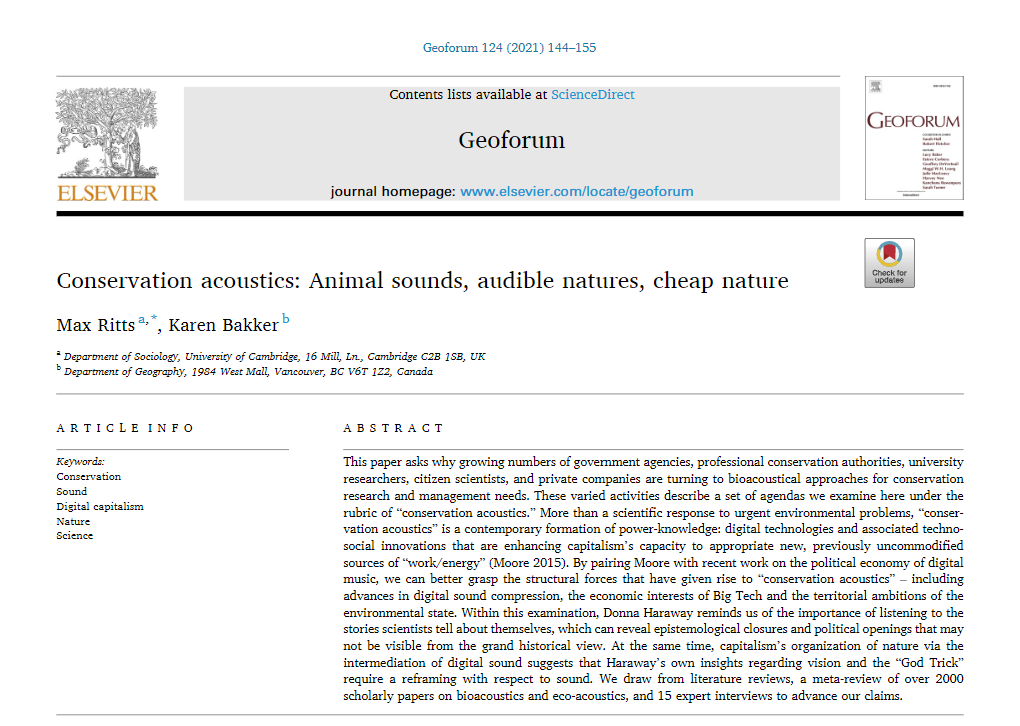
Abstract
This paper asks why growing numbers of government agencies, professional conservation authorities, university researchers, citizen scientists, and private companies are turning to bioacoustical approaches for conservation research and management needs. These varied activities describe a set of agendas we examine here under the rubric of “conservation acoustics.” More than a scientific response to urgent environmental problems, “conservation acoustics” is a contemporary formation of power-knowledge: digital technologies and associated techno-social innovations that are enhancing capitalism's capacity to appropriate new, previously uncommodified sources of “work/energy” (Moore 2015). By pairing Moore with recent work on the political economy of digital music, we can better grasp the structural forces that have given rise to “conservation acoustics” – including advances in digital sound compression, the economic interests of Big Tech and the territorial ambitions of the environmental state. Within this examination, Donna Haraway reminds us of the importance of listening to the stories scientists tell about themselves, which can reveal epistemological closures and political openings that may not be visible from the grand historical view. At the same time, capitalism’s organization of nature via the intermediation of digital sound suggests that Haraway’s own insights regarding vision and the “God Trick” require a reframing with respect to sound. We draw from literature reviews, a meta-review of over 2000 scholarly papers on bioacoustics and eco-acoustics, and 15 expert interviews to advance our claims. Ritts, M. and K. Bakker. 2021. “Conservation acoustics: Animal sounds, audible natures, cheap nature.” Geoforum 124: 144-155.
More InfoAuthors
Max Ritts
Karen Bakker
Visualizing water-energy nexus landscapes
2021.07.29
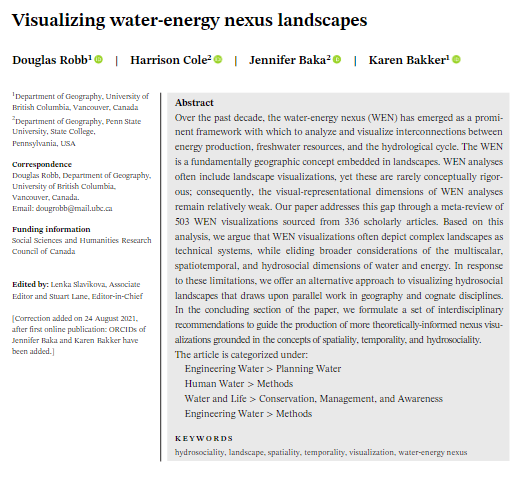
Abstract
Over the past decade, the water-energy nexus (WEN) has emerged as a prominent framework with which to analyze and visualize interconnections between energy production, freshwater resources, and the hydrological cycle. The WEN is a fundamentally geographic concept embedded in landscapes. WEN analyses often include landscape visualizations, yet these are rarely conceptually rigorous; consequently, the visual-representational dimensions of WEN analyses remain relatively weak. Our paper addresses this gap through a meta-review of 503 WEN visualizations sourced from 336 scholarly articles. Based on this analysis, we argue that WEN visualizations often depict complex landscapes as technical systems, while eliding broader considerations of the multiscalar, spatiotemporal, and hydrosocial dimensions of water and energy. In response to these limitations, we offer an alternative approach to visualizing hydrosocial landscapes that draws upon parallel work in geography and cognate disciplines. In the concluding section of the paper, we formulate a set of interdisciplinary recommendations to guide the production of more theoretically-informed nexus visualizations grounded in the concepts of spatiality, temporality, and hydrosociality. Robb, D., J. Baka, C. Harrison, K. Bakker. 2021. Visualizing water-energy nexus landscapes. WIRES Water. http://doi.org/10.1002/wat2.1548
More InfoAuthors
Douglas Robb
Harrison Cole
Jennifer Baka
Karen Bakker
Material Worlds Redux: Mobilizing Materiality within Critical Resource Geography
2021.07.13

Abstract
This Handbook provides an essential guide to the study of resources and their role in socio-environmental change. With original contributions from more than 60 authors with expertise in a wide range of resource types and world regions, it offers a toolkit of conceptual and methodological approaches for documenting, analyzing, and reimagining resources and the worlds with which they are entangled. The volume has an introduction and four thematic sections. The introductory chapter outlines key trajectories for thinking critically with and about resources. Chapters in Section I, "(Un)knowing resources," offer distinct epistemological entry points and approaches for studying resources. Chapters in Section II, "(Un)knowing resource systems," examine the components and logics of the capitalist systems through which resources are made, circulated, consumed, and disposed of, while chapters in Section III, "Doing critical resource geography: Methods, advocacy, and teaching," focus on the practices of critical resource scholarship, exploring the opportunities and challenges of carrying out engaged forms of research and pedagogy. Chapters in Section IV, "Resource-making/world-making," use case studies to illustrate how things are made into resources and how these processes of resource-making transform socio-environmental life. This vibrant and diverse critical resource scholarship provides an indispensable reference point for researchers, students, and practitioners interested in understanding how resources matter to the world and to the systems, conflicts, and debates that make and remake it. Bridge, G. and K. Bakker. Material Worlds Redux. 2021. In Eds. Himley, M., Havice, E., and Valdivia, G. Handbook of Critical Resource Geography. Routledge.
More InfoAuthors
Karen Bakker
Gavin Bridge
Disclosing Influence: Hydraulic fracturing, interest groups, and state policy processes in the United States
2020.12.01
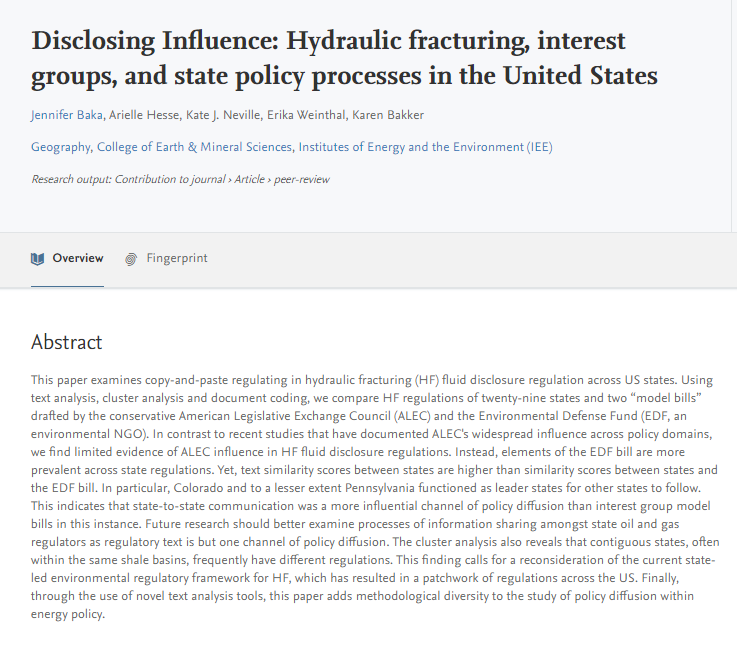
Abstract
This paper examines copy-and-paste regulating in hydraulic fracturing (HF) fluid disclosure regulation across US states. Using text analysis, cluster analysis and document coding, we compare HF regulations of twenty-nine states and two “model bills” drafted by the conservative American Legislative Exchange Council (ALEC) and the Environmental Defense Fund (EDF, an environmental NGO). In contrast to recent studies that have documented ALEC's widespread influence across policy domains, we find limited evidence of ALEC influence in HF fluid disclosure regulations. Instead, elements of the EDF bill are more prevalent across state regulations. Yet, text similarity scores between states are higher than similarity scores between states and the EDF bill. In particular, Colorado and to a lesser extent Pennsylvania functioned as leader states for other states to follow. This indicates that state-to-state communication was a more influential channel of policy diffusion than interest group model bills in this instance. Future research should better examine processes of information sharing amongst state oil and gas regulators as regulatory text is but one channel of policy diffusion. The cluster analysis also reveals that contiguous states, often within the same shale basins, frequently have different regulations. This finding calls for a reconsideration of the current state-led environmental regulatory framework for HF, which has resulted in a patchwork of regulations across the US. Finally, through the use of novel text analysis tools, this paper adds methodological diversity to the study of policy diffusion within energy policy. Baka, J., Hesse, A., Neville, K. J., Weinthal, E., & Bakker, K. 2020. Disclosing Influence: Hydraulic fracturing, interest groups, and state policy processes in the United States. Energy Research & Social Science, 70, 101734.
More InfoAuthors
Jennifer Baka
Arielle Hesse
Kate J. Neville
Erika Weinthal
Karen Bakker
Planetary Voyeurism
2020.11.12

Abstract
GEO—Earth—is a word that simultaneously signifies something vast and elemental. It refers to both the planet on which we live and the soil that sustains us. GEO is the physical and representational bedrock of landscape architecture—the foundation of many disciplines from which we draw our knowledge. Geography, geology, and geometry, in particular, are fundamental to our discipline’s intellectual core. And now, we seem ever more entangled in GEO as some scholars across the sciences and humanities argue that humans should be recognized as agents of change at geologic time scales. LA+ GEO is guest edited by Karen M’Closkey and Keith VanDerSys, and includes contributions by Lucy Lippard, Shannon Mattern, Robert Pietrusko, Matthew Wilson, William Rankin, Doglas Robb + Karen Bakker, Jennifer Gabrys, Noah Heringman, Janine Randerson, Rania Ghosn, Lisa Parks, Jeffry Nesbit + David Salomon, Aisling O'Carroll, and B.W. Higman. Robb, D. and K. Bakker. 2020. Planetary Voyeurism. Interdisciplinary Journal of Landscape Architecture: LA + GEO. November. 12, 50-55.
More InfoAuthors
Douglas Robb
Karen Bakker
Digital Technologies and Dynamic Resource Management
2020.01.01
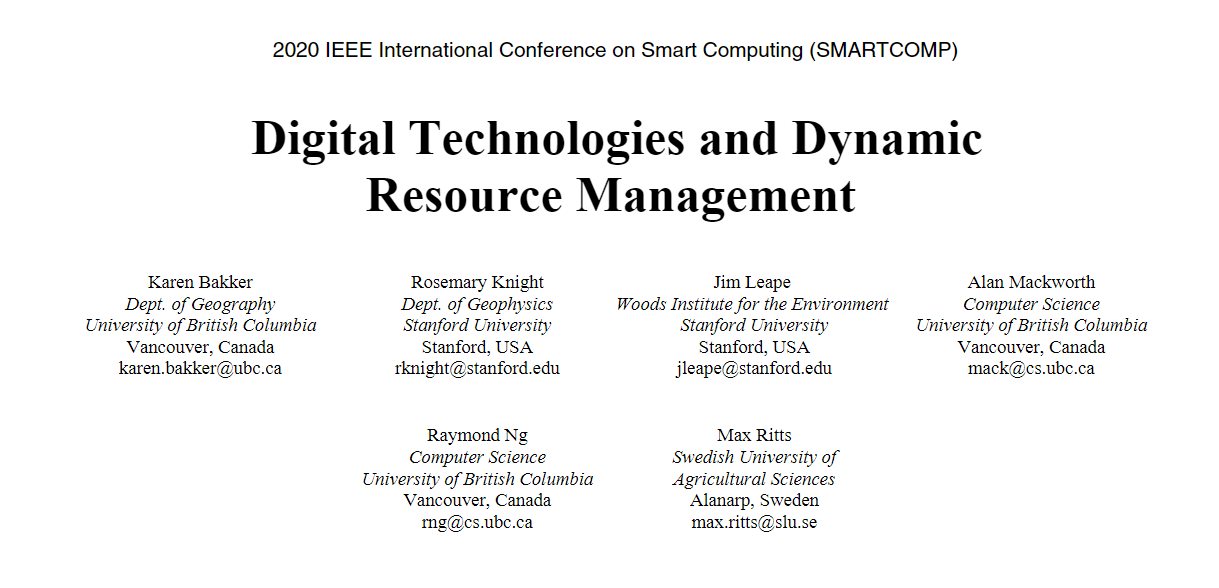
Abstract
This paper presents a meta-review of digital technology applications for dynamic environmental management, which provide contemporaneous signals and incentives to influence resource users’ behaviors, thereby generating more spatially and temporally flexible responses to variable ecosystem conditions. Bakker, K., Ng, R., Mackworth, A., Knight, R., Leape, J., and Ritts, M. 2020. Digital technologies and dynamic resource management. IEEE SMARTCOMP. In 2020 IEEE International Conference on Smart Computing (SMARTCOMP), pp. 368-373. IEEE, 2020.
More InfoAuthors
Karen Bakker
Rosemary Knight
Jim Leape
Alan Mackworth
Raymond Ng
Max Ritts
New forms: Anthropocene Festivals and experimental environmental governance
2019.11.26
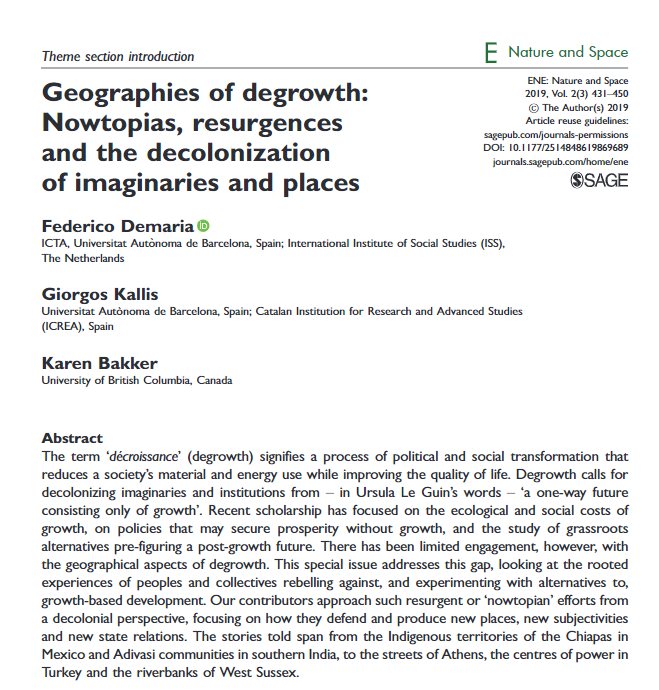
Abstract
This paper is about the “Anthropocene Festival,” a concept we develop to explore proliferating and multi-faceted arts-based events, happenings, unconferences, and workshops which collectively model novel forms of environmental governance. The Anthropocene Festival mobilizes disruptive and creative possibilities at the juncture of digital and ecological life, while simultaneously embodying developments in the institutional form of green capitalism. To argue these points, we locate the Anthropocene Festival within a proliferation of new institutional environmentalisms, including biennales, hackathons, and initiatives in the neoliberal university. Next, we provide a survey of recent examples, observing across them an increasingly hegemonic template of environmental sociality—or model of collective interaction—rooted in digital technologies. Next, we discuss two examples of environmental governance propositions expressive of the Anthropocene Festival ethos: (1) Climate Symphony, a project that uses sonification techniques to facilitate new understandings of climate change, (2) Terra0, an art project which reconceptualizes forest ecology and non-human agency using blockchain technology. We conclude by arguing that the ontological generativity of the Anthropocene Festival arises from the dissenting approaches to conventional models of environmental governance it cultivates, but that the Anthropocene Festival does not necessarily carry a radical political valence because of this. Ritts, M. and K. Bakker. 2019. New Forms: Anthropocene Festivals and Experimental Environmental Governance. Environment and Planning E, special issue on Environmental Data Infrastructures (Eds. Nost, E., and J. Goldstein). doi.org/10.1177/2514848619886974
More InfoAuthors
Max Ritts
Karen Bakker
Environmental Knowledge Cartographies: Evaluating Competing Discourses in US Hydraulic Fracturing Rulemaking
2019.11.02
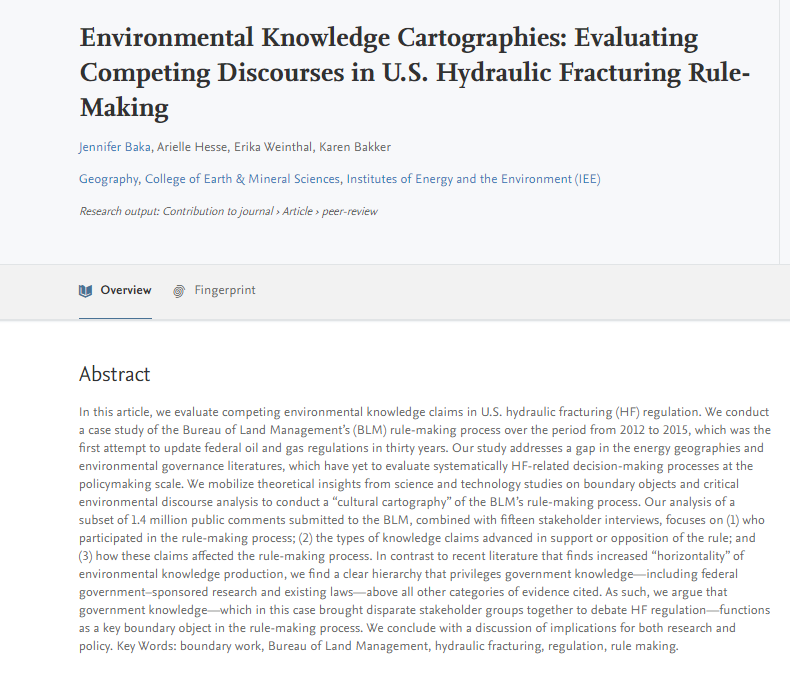
Abstract
In this article, we evaluate competing environmental knowledge claims in U.S. hydraulic fracturing (HF) regulation. We conduct a case study of the Bureau of Land Management’s (BLM) rule-making process over the period from 2012 to 2015, which was the first attempt to update federal oil and gas regulations in thirty years. Our study addresses a gap in the energy geographies and environmental governance literatures, which have yet to evaluate systematically HF-related decision-making processes at the policymaking scale. We mobilize theoretical insights from science and technology studies on boundary objects and critical environmental discourse analysis to conduct a “cultural cartography” of the BLM’s rule-making process. Our analysis of a subset of 1.4 million public comments submitted to the BLM, combined with fifteen stakeholder interviews, focuses on (1) who participated in the rule-making process; (2) the types of knowledge claims advanced in support or opposition of the rule; and (3) how these claims affected the rule-making process. In contrast to recent literature that finds increased “horizontality” of environmental knowledge production, we find a clear hierarchy that privileges government knowledge—including federal government–sponsored research and existing laws—above all other categories of evidence cited. As such, we argue that government knowledge—which in this case brought disparate stakeholder groups together to debate HF regulation—functions as a key boundary object in the rule-making process. We conclude with a discussion of implications for both research and policy. Key Words: boundary work, Bureau of Land Management, hydraulic fracturing, regulation, rule making. Baka, J., Hesse, A., Weinthal, E., and K. Bakker. 2019. Environmental Knowledge Cartographies: Evaluating Competing Discourses in US Hydraulic Fracturing Rulemaking. Annals of the Association of American Geographers, 1 – 20.
More InfoAuthors
Jennifer Baka
Arielle Hesse
Erika Weinthal
Karen Bakker
Geographies of degrowth: Nowtopias, resurgences and the decolonization of imaginaries and places
2019.08.21
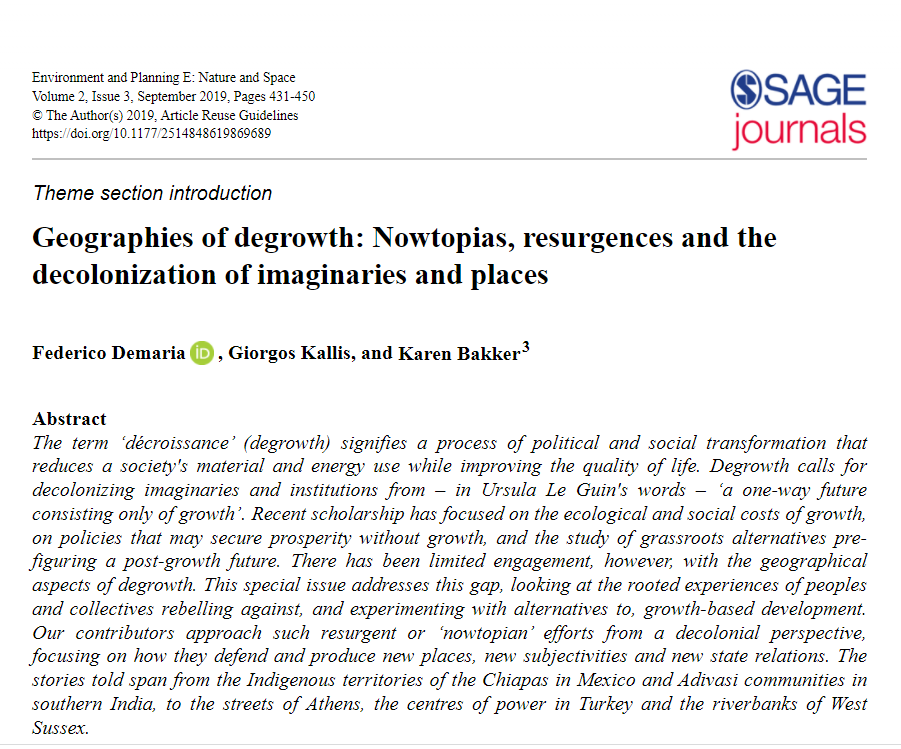
Abstract
The term ‘décroissance’ (degrowth) signifies a process of political and social transformation that reduces a society's material and energy use while improving the quality of life. Degrowth calls for decolonizing imaginaries and institutions from – in Ursula Le Guin's words – ‘a one-way future consisting only of growth’. Recent scholarship has focused on the ecological and social costs of growth, on policies that may secure prosperity without growth, and the study of grassroots alternatives pre-figuring a post-growth future. There has been limited engagement, however, with the geographical aspects of degrowth. This special issue addresses this gap, looking at the rooted experiences of peoples and collectives rebelling against, and experimenting with alternatives to, growth-based development. Our contributors approach such resurgent or ‘nowtopian’ efforts from a decolonial perspective, focusing on how they defend and produce new places, new subjectivities and new state relations. The stories told span from the Indigenous territories of the Chiapas in Mexico and Adivasi communities in southern India, to the streets of Athens, the centres of power in Turkey and the riverbanks of West Sussex. 2018 Demaria, F., Kallis, G. and K. Bakker. “Geographies of degrowth: Nowtopias, resurgences and the decolonization of imaginaries and places.” Special Issue of Environment and Planning E.
More InfoAuthors
Federico Demaria
Giorgos Kallis
Karen Bakker
Rendering Technical, Rendering Sacred: The Politics of Hydroelectric Development on British Columbia’s Saaghii Naachii/Peace River
2019.08.01
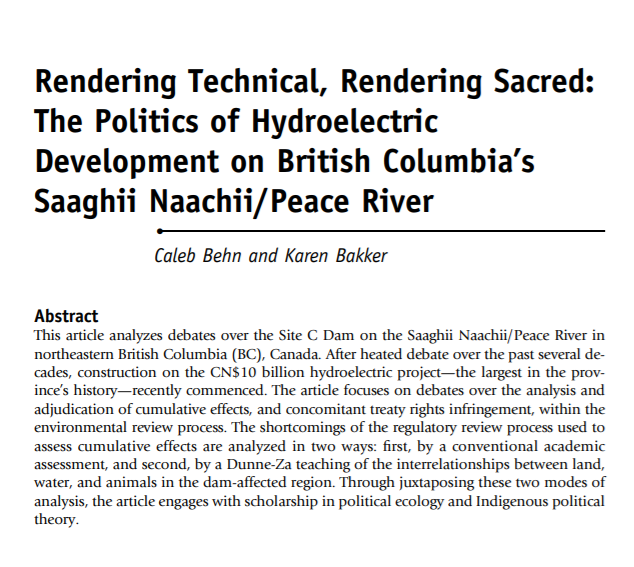
Abstract
This article analyzes debates over the Site C Dam on the Saaghii Naachii/Peace River in northeastern British Columbia (BC), Canada. After heated debate over the past several decades, construction on the CN$10 billion hydroelectric project—the largest in the province’s history—recently commenced. The article focuses on debates over the analysis and adjudication of cumulative effects, and concomitant treaty rights infringement, within the environmental review process. The shortcomings of the regulatory review process used to assess cumulative effects are analyzed in two ways: first, by a conventional academic assessment, and second, by a Dunne-Za teaching of the interrelationships between land, water, and animals in the dam-affected region. Through juxtaposing these two modes of analysis, the article engages with scholarship in political ecology and Indigenous political theory. Behn, C., and K. Bakker. 2019. “Rendering Technical, Rendering Sacred: The politics of hydroelectric development on British Columbia’s Saaghii Naachii/Peace River.” Global Environmental Politics. 19(3), 98 – 119. DOI: doi.org/10.1162/glep_a_00518.
More InfoAuthors
Caleb Behn
Karen Bakker
Engaging Colonial Entanglements: “Treatment as a State” Policy for Indigenous Water Co-Governance
2019.08.01
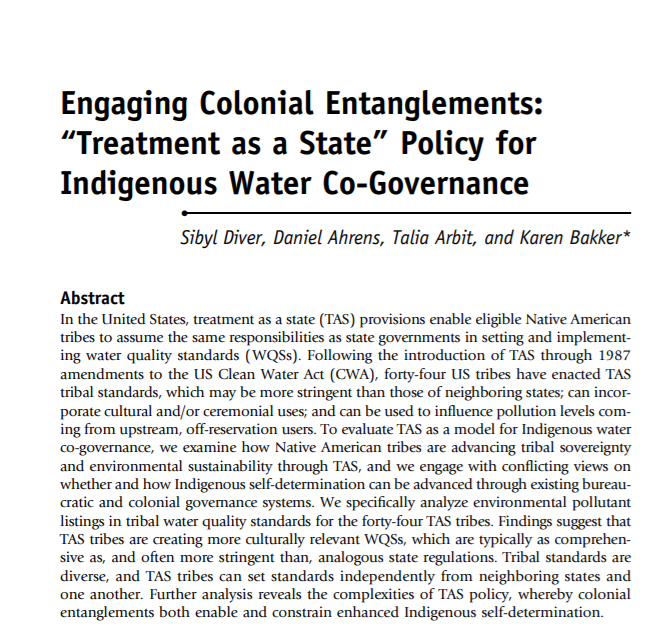
Abstract
In the United States, treatment as a state (TAS) provisions enable eligible Native American tribes to assume the same responsibilities as state governments in setting and implementing water quality standards (WQSs). Following the introduction of TAS through 1987 amendments to the US Clean Water Act (CWA), forty-four US tribes have enacted TAS tribal standards, which may be more stringent than those of neighboring states; can incorporate cultural and/or ceremonial uses; and can be used to influence pollution levels coming from upstream, off-reservation users. To evaluate TAS as a model for Indigenous water co-governance, we examine how Native American tribes are advancing tribal sovereignty and environmental sustainability through TAS, and we engage with conflicting views on whether and how Indigenous self-determination can be advanced through existing bureaucratic and colonial governance systems. We specifically analyze environmental pollutant listings in tribal water quality standards for the forty-four TAS tribes. Findings suggest that TAS tribes are creating more culturally relevant WQSs, which are typically as comprehensive as, and often more stringent than, analogous state regulations. Tribal standards are diverse, and TAS tribes can set standards independently from neighboring states and one another. Further analysis reveals the complexities of TAS policy, whereby colonial entanglements both enable and constrain enhanced Indigenous self-determination. Sibyl Diver, Daniel Ahrens, Talia Arbit, Karen Bakker; Engaging Colonial Entanglements: “Treatment as a State” Policy for Indigenous Water Co-Governance. Global Environmental Politics 2019; 19 (3): 33–56. doi: https://doi.org/10.1162/glep_a_00517
More InfoAuthors
Sibyl Diver
Daniel Ahrens
Talia Arbit
Karen Bakker
Contested knowledges in hydroelectric project assessment: The case of Canada’s Site C Dam
2019.05.22
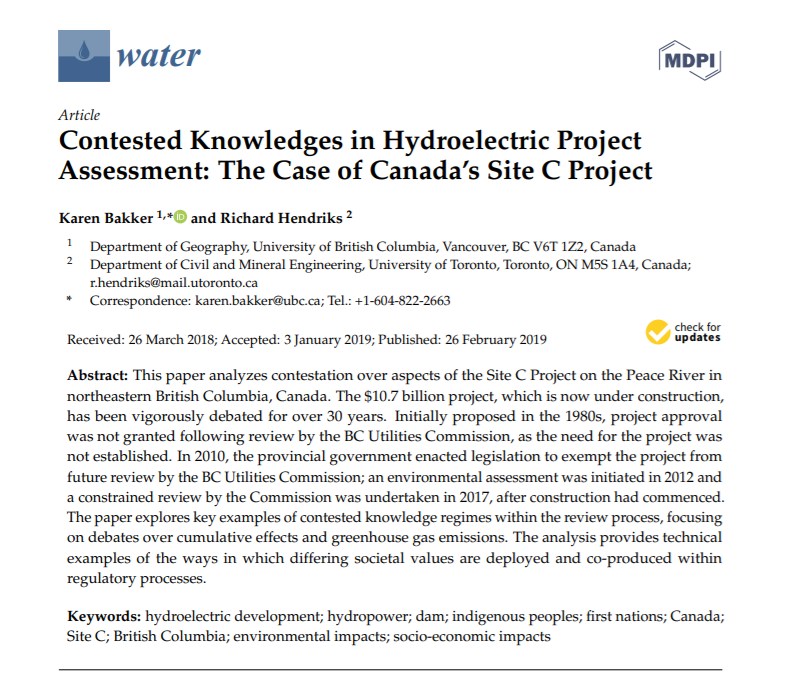
Abstract
This paper analyzes contestation over aspects of the Site C Project on the Peace River in northeastern British Columbia, Canada. The $10.7 billion project, which is now under construction, has been vigorously debated for over 30 years. Initially proposed in the 1980s, project approval was not granted following review by the BC Utilities Commission, as the need for the project was not established. In 2010, the provincial government enacted legislation to exempt the project from future review by the BC Utilities Commission; an environmental assessment was initiated in 2012 and a constrained review by the Commission was undertaken in 2017, after construction had commenced. The paper explores key examples of contested knowledge regimes within the review process, focusing on debates over cumulative effects and greenhouse gas emissions. The analysis provides technical examples of the ways in which differing societal values are deployed and co-produced within regulatory processes Bakker, K. and R. Hendriks. 2019. “Contested knowledges in hydroelectric project assessment: The case of Canada’s Site C Dam.” Special issue on “Contested Knowledges: Water Conflicts on Large Dams and Mega-Hydraulic Development.” Water. 11(3), 406 – 424.
More InfoAuthors
Richard Hendriks
Karen Bakker
Smart Earth: A meta-review and implications for environmental governance
2018.07.31
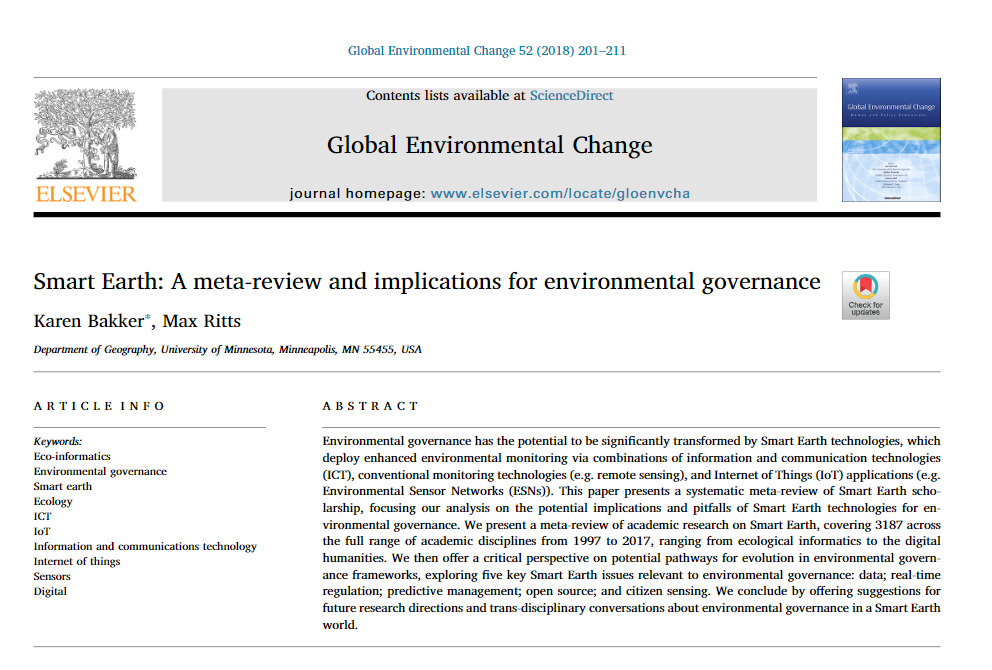
Abstract
Environmental governance has the potential to be significantly transformed by Smart Earth technologies, which deploy enhanced environmental monitoring via combinations of information and communication technologies (ICT), conventional monitoring technologies (e.g. remote sensing), and Internet of Things (IoT) applications (e.g. Environmental Sensor Networks (ESNs)). This paper presents a systematic meta-review of Smart Earth scholarship, focusing our analysis on the potential implications and pitfalls of Smart Earth technologies for environmental governance. We present a meta-review of academic research on Smart Earth, covering 3187 across the full range of academic disciplines from 1997 to 2017, ranging from ecological informatics to the digital humanities. We then offer a critical perspective on potential pathways for evolution in environmental governance frameworks, exploring five key Smart Earth issues relevant to environmental governance: data; real-time regulation; predictive management; open source; and citizen sensing. We conclude by offering suggestions for future research directions and trans-disciplinary conversations about environmental governance in a Smart Earth world. 2018 Bakker, K and M. Ritts. Smart Earth: A meta-review and issues for environmental governance. Global Environmental Change.
More InfoAuthors
Karen Bakker
Max Ritts
Agenda-Setting at the Energy-Water Nexus: Constructing and Maintaining a Policy Monopoly in U.S. Hydraulic Fracturing Regulation
2018.04.10

Abstract
Despite calls to increase federal oversight of hydraulic fracturing (HF), the U.S. Congress has maintained a regulatory system in which environmental regulatory authority is devolved to the states. We argue that this system is characterized by a long-standing “policy monopoly”: a form of stability in policy agenda-setting in which a specific manner of framing and regulating a policy issue becomes hegemonic. Integrating theories on agenda-setting and environmental discourse analysis, we develop a nuanced conceptualization of policy monopoly that emphasizes the significance of regulatory history, public perceptions, industry–government relations, and environmental “storylines.” We evaluate how a policy monopoly in U.S. HF regulation has been constructed and maintained through a historical analysis of oil and gas regulation and a discourse analysis of eleven select congressional energy committee hearings. This research extends scholarship on agenda-setting by better illuminating the importance of political economic and geographic factors shaping regulatory agendas and outcomes. 2018 Baka, J., K. Neville, E. Weinthal, and K. Bakker. (2018). Policy Mobilities and Agenda-Setting at the Energy-Water Nexus: Constructing and Maintaining a Policy Monopoly in US Hydraulic Fracturing Regulation. Review of Policy Research. 35 (3): 439-465(DOI) - 10.1111/ropr.12287
More InfoAuthors
Jennifer Baka
Kate J. Neville
Erika Weinthal
Karen Bakker
Indigenous Peoples and Water Governance in Canada: Regulatory Injustice and Prospects for Reform (In book: Water Justice)
2018.01.01
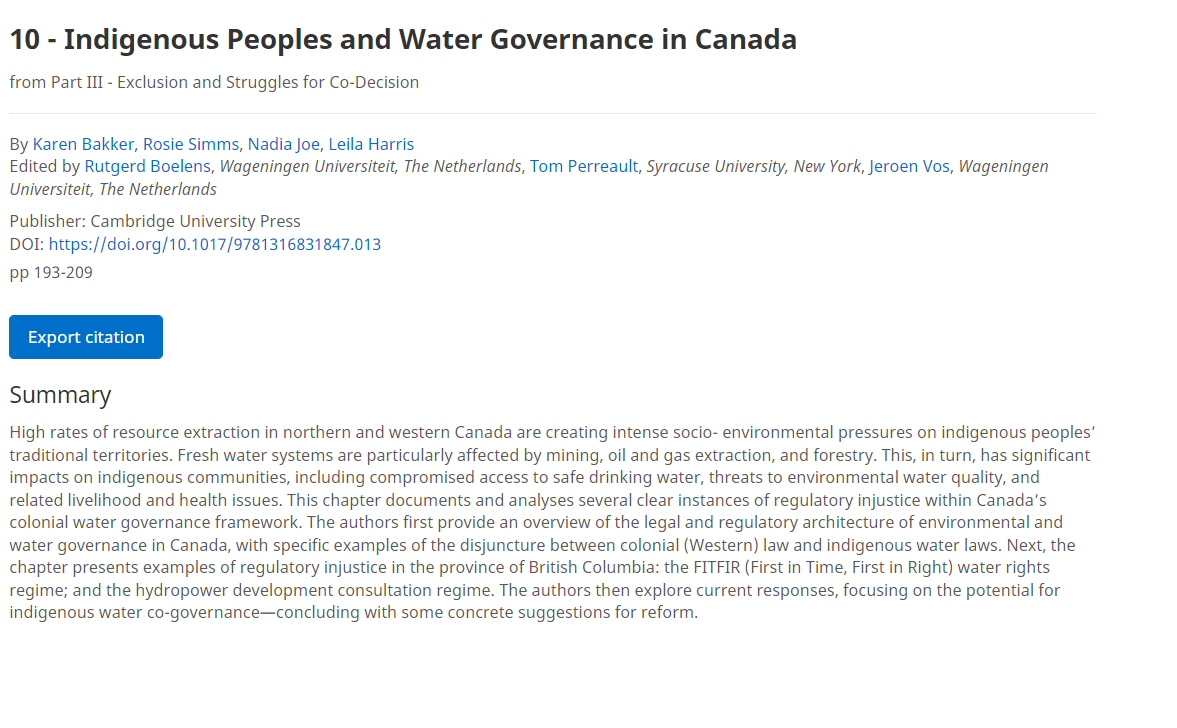
Abstract
This chapter explores two interrelated examples of injustice in access to water for Indigenous peoples in Canada. Injustice, from our perspective, has two main dimensions: limited access to safe water (water security); and exclusion from water governance and management. In Canada, the roots of this injustice run deep. Indigenous peoples in Canada have historically been excluded from water governance by the colonial settler state. To date, the question of whether water is included within Aboriginal title (legal land rights) has not yet been settled by the Canadian courts (Laidlaw and Passelac-Ross, 2010; Phare, 2009). As a result, Indigenous water rights in Canada, with few exceptions, have been treated implicitly within land-focused legal claims. Moreover, historical inequalities have often constrained Indigenous communities’ access to water and exercise of Indigenous rights (Phare, 2009; Simms, 2014; Von der Porton, 2012; Von der Porten and De Loë, 2013a, 2013b). High-risk water systems - systems with major deficiencies, which pose a high risk to water quality - pose a threat to the health of one-third of First Nations people living on reserves (McLaren, 2016; Neegan Burnside Ltd., 2011). In short, stark injustices exist with respect to water for Indigenous communities in Canada. To some degree, this situation is a direct result of Canada’s fragmented system of governance: municipal, provincial and federal governments hold responsibility for different aspects of water management. Provincial governments are largely responsible for fresh water (and delegate drinking water to municipalities), whereas federal responsibilities include a range of issues related to water rights for Indigenous communities. Competing jurisdictional priorities, lack of clarity on roles and responsibilities, and a failure to cooperate have resulted in systemic governance gaps leading to increased risk in water supply systems and widespread underfunding, which some scholars have characterized as institutionalized racism (Mascarenhas, 2007; Murdocca, 2010). These issues are particularly acute in Canada’s westernmost province of British Columbia (BC). In most of the province, formal treaties were never signed between the Crown and Indigenous communities. This is a significant issue for many reasons, not least of which is the fact that the potential for legal recognition of water rights creates the possibility for extensive Indigenous control of water governance. This, however, is currently far from the reality in practice. 2018 Bakker, K., L. Harris, N. Joe, and R. Simms. “Indigenous Peoples and Water Governance in Canada: Regulatory Injustice and Prospects for Reform.” In Water Justice,ed. R. Boelens et al., Cambridge: Cambridge University Press, 193-209
More InfoAuthors
Karen Bakker
Rosie Simms
Nadia Joe
Leila M. Harris
The role of science-policy interface in sustainable urban water transitions: Lessons from Rotterdam
2017.07.01
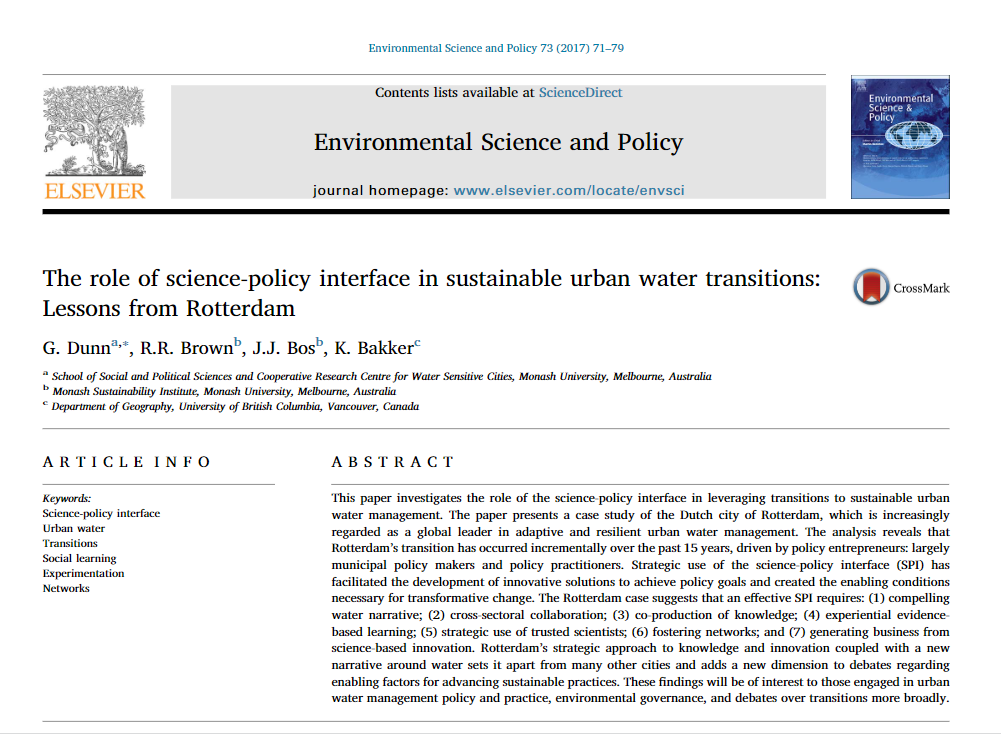
Abstract
This paper investigates the role of the science-policy interface in leveraging transitions to sustainable urban water management. The paper presents a case study of the Dutch city of Rotterdam, which is increasingly regarded as a global leader in adaptive and resilient urban water management. The analysis reveals that Rotterdam’s transition has occurred incrementally over the past 15 years, driven by policy entrepreneurs: largely municipal policy makers and policy practitioners. Strategic use of the science-policy interface (SPI) has facilitated the development of innovative solutions to achieve policy goals and created the enabling conditions necessary for transformative change. The Rotterdam case suggests that an effective SPI requires: (1) compelling water narrative; (2) cross-sectoral collaboration; (3) co-production of knowledge; (4) experiential evidence-based learning; (5) strategic use of trusted scientists; (6) fostering networks; and (7) generating business from science-based innovation. Rotterdam’s strategic approach to knowledge and innovation coupled with a new narrative around water sets it apart from many other cities and adds a new dimension to debates regarding enabling factors for advancing sustainable practices. These findings will be of interest to those engaged in urban water management policy and practice, environmental governance, and debates over transitions more broadly. 2017 Dunn, G., R. Brown, J. Bos, and K. Bakker. (2017). “The Role of the Science-Policy Interface in Sustainable Urban Water Transitions: Lessons from Rotterdam.” Environmental Science & Policy. 73: 71-79.
More InfoAuthors
Gemma Dunn
Rebekah Brown
Joannette J. Bos
Karen Bakker
Debating Unconventional Energy: Social, Political, and Economic Implications
2017.06.21
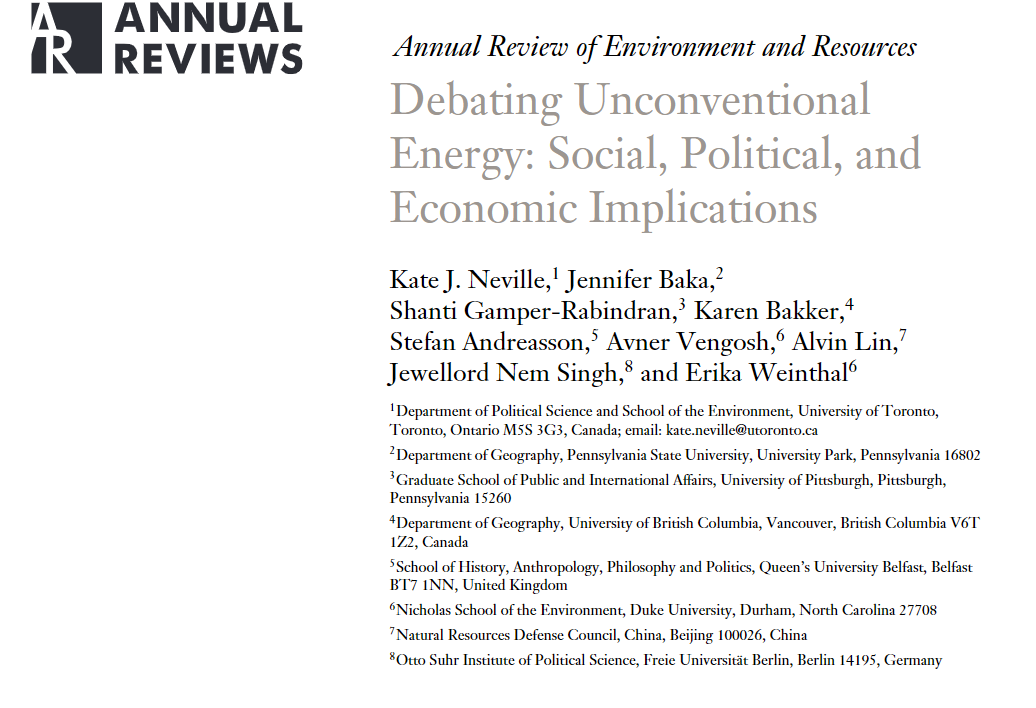
Abstract
The extraction of unconventional oil and gas—from shale rocks, tight sand, and coalbed formations—is shifting the geographies of fossil fuel production, with complex consequences. Following Jackson et al.’s (1) natural science survey of the environmental consequences of hydraulic fracturing, this review examines social science literature on unconventional energy. After an overview of the rise of unconventional energy, the review examines energy economics and geopolitics, community mobilization, and state and private regulatory responses. Unconventional energy requires different frames of analysis than conventional energy because of three characteristics: increased drilling density, low-carbon and “clean” energy narratives of natural gas, and distinct ownership and royalty structures. This review points to the need for an interdisciplinary approach to analyzing the resulting dynamic, multilevel web of relationships that implicates land, water, food, and climate. Furthermore, the review highlights how scholarship on unconventional energy informs the broader energy landscape and contested energy futures. 2017 Neville, K., Baka, J., Gamper-Rabindran, S., Bakker, K., Andreasson, S., Vengosh, A., Lin, A., Nem Singh, J., and Weinthal, E. (2017). Debating unconventional energy: Social, political and economic implications. Annual Review of Environment and Resources.42: 241-266
More InfoAuthors
Kate J. Neville
Jennifer Baka
Shanti Gamper-Rabindran
Karen Bakker
Stefan Andreasson
Avner Vengosh
Alvin Lin
Jewellord Nem Singh
Erika Weinthal
Large Dam Development: From Trojan Horse to Pandora’s Box (in book: Mega projects and Risk: An Anatomy of Ambition)
2017.03.01
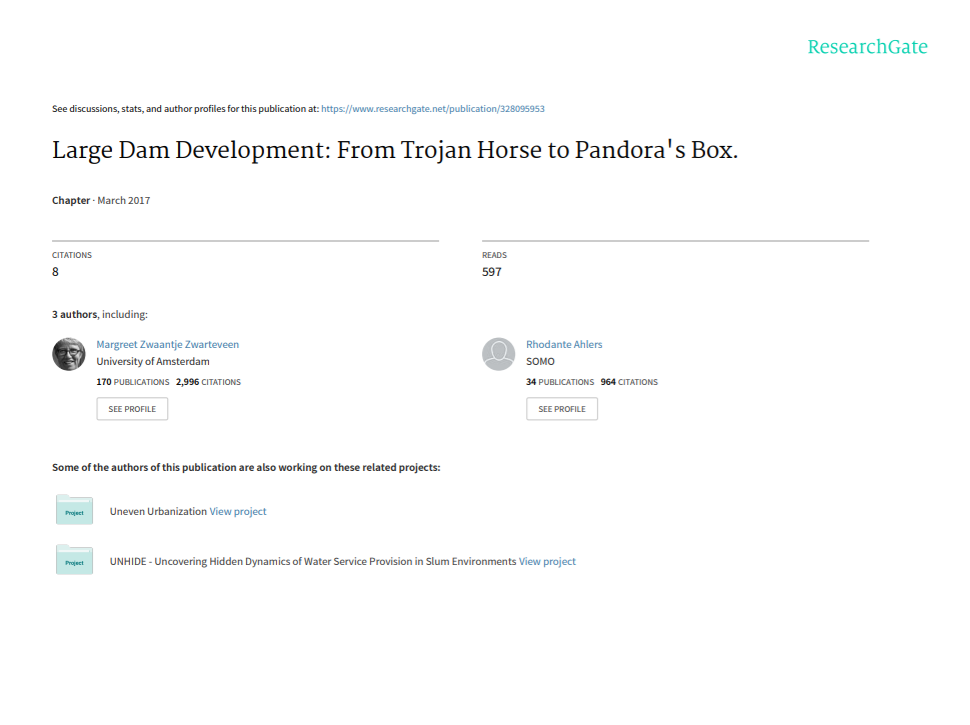
Abstract
In recent years, large hydraulic infrastructure has again figured prominently on development agendas. As critics note, the concerns that curbed large dam development towards the end of the 20th century remain valid: the benefits and costs of large dams are unevenly and inequitably distributed, and large dams are in many instances a high risk and high cost strategy. Yet there are important distinctions, we argue, between large dam development in the 20th and 21st centuries. To support this argument, we draw on the Lefebvrian notion of the “production of space”: we conceptually frame dams not as mere objects in space, but also as agents in dynamic and contested spatial strategies—simultaneously material, political, and biopolitical. We deploy this conceptual framework to argue that the context of dam development today is radically different from that of the 20th century, illustrated by two examples: the case of the Aswan High Dam on the Nile and the Nam Theun 2 on the Mekong. 20th century dams, we claim, may be likened to Trojan Horses: while legitimized as mechanisms of economic development, they were also important embodiments of political and ideological spatial strategies—notably the spatial extension of nation-state power. In contrast, large dams of the 21st century are more like Pandora’s Boxes: due to a proliferation of private and quasi-private actors involved in dam development and the blurring of the boundaries between public and private rights and responsibilities, they constitute institutionally opaque and fragmented settings—in which power is distributed and thus the role of the nation-state attenuated. This tremendously complicates the assessment of the responsibilities for and costs, benefits and risks of dam building, and makes transparently and democratically organizing dam governance more difficult than it ever was. We propose the concept of “dam democracy” as an organizing principle for addressing these issues, and enabling equitable and sustainable decision-making regarding large dams in the 21st century. 2017 Zwarteween, M., R. Ahlers, and K. Bakker. “Large Dam Development: From Trojan Horse to Pandora’s Box.” In Megaprojectsand Risk: An Anatomy of Ambition,ed. Bent Flyvbjerg,Nils Bruzelius, and Werner Rothengatter. 556 – 576, Oxford: Oxford University Press
More InfoAuthors
Margreet Zwaantje Zwarteveen
Rhodante Ahlers
Karen Bakker
The Business of Water (In book: Oxford Handbook of Water Politics and Water Policy)
2016.12.01
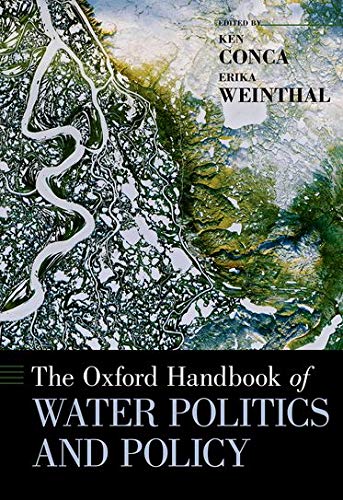
Abstract
Over the past three decades, water supply has become big business, and fierce debates have emerged in many countries over water privatization and water markets. This chapter reviews five dimensions of this debate: (1) the privatization of ownership and management; (2) the commercialization of water management organizations; (3) the environmental valuation and pricing of water; (4) the marketization of exchange mechanisms (“water trading” and “water markets”); and (5) the neoliberalization of governance. The analysis offers an analytical framework within which more structured, comprehensive assessments of market environmentalism—which is multifaceted and highly varied, difficult to implement in practice, and by no means hegemonic—in the water sector might be conducted. The chapter concludes with some reflections on the future of this debate. 2017 Bakker, K. “The Business of Water.” In Oxford Handbook of Water Politics and Water Policy,ed. K. Conca and E. Weinthal. Oxford: Oxford University Press
More InfoAuthors
Karen Bakker
Transcending Borders Through Postcolonial Water Governance? Indigenous Water Governance Across the Canada-US Border
2016.11.01
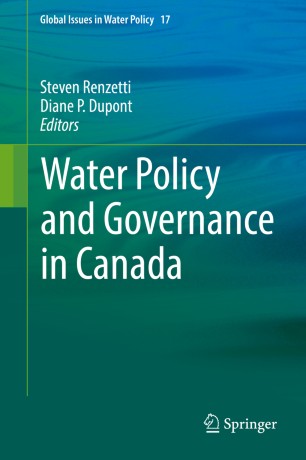
Abstract
This chapter explores the evolution of transboundary water governance along the Canada-US border. We examine two key examples in two eras of water management across the Canada-US border, separated by more than a century. First, we examine the Boundary Waters Treaty (a bi-national agreement between the federal governments of Canada and the United States), as an emblematic example of the dominant concerns that underpinned (colonial settler) water governance at the turn of the twentieth century, creating the framework in which nation-state governance mechanisms were dominant. Second, we examine the development of Indigenous-led transboundary governing bodies, focusing on the Yukon River Intertribal Watershed Council. We argue that the YRITWC is emblematic of a new era of transboundary water governance: participatory, and (in an increasing number of cases) Indigenous led – which implies new principles for water governance, involving an expanded network of actors beyond the nation-state. Norman E.S., Bakker K. (2017) Transcending Borders Through Postcolonial Water Governance? Indigenous Water Governance Across the Canada-US Border. In: Renzetti S., Dupont D. (eds) Water Policy and Governance in Canada. Global Issues in Water Policy, vol 17. Springer, Cham. https://doi.org/10.1007/978-3-319-42806-2_8
More InfoAuthors
Emma S. Norman
Karen Bakker
Canadian Drinking Water Policy: Jurisdictional Variation in the Context of Decentralized Water Governance (In book: Water Policy and Governance in Canada)
2016.10.31

Abstract
This chapter reviews Canada’s approach to drinking water governance, focusing on the regulations, policies, practices and institutions related to the management and provision of drinking water. This review is significant given Canada’s highly decentralized approach to water governance. We critically evaluate the implications of decentralization for drinking water safety, examining both the uptake of voluntary national guidelines across Canadian jurisdictions, as well as application of day-to-day microbial risk assessment and management practices in various agencies in two provinces (Ontario and BC). Learning from these analyses, we identify a high degree of variability, specifically: (1) variation in the uptake of national Drinking Water Quality Guidelines across provinces and territories; and (2) considerable variability in microbial risk assessment and management practices across provinces and between agencies. We discuss the implications of these findings in light of ongoing harmonization and subsidiarity debates, as well as discussions as to whether compliance should be voluntary or legally binding. Our analysis indicates that the Canadian approach has contributed to data gaps and urban-rural disparities, and reduced capacity for integrated decision-making and effective oversight. 2016 Dunn, G., L. Harris, and K. Bakker. “Canadian Drinking Water Policy: Jurisdictional Variation in the Context of Decentralized Water Governance.” In Water Policy and Governance in Canada, vol. 17, ed. S. Renzetti and D. Dupont, 301–20. New York: Springer.
More InfoAuthors
Gemma Dunn
Leila Harris
Karen Bakker
Standing on the shoulders of giants: Understanding changes in urban water practice through the lens of complexity science
2016.10.17
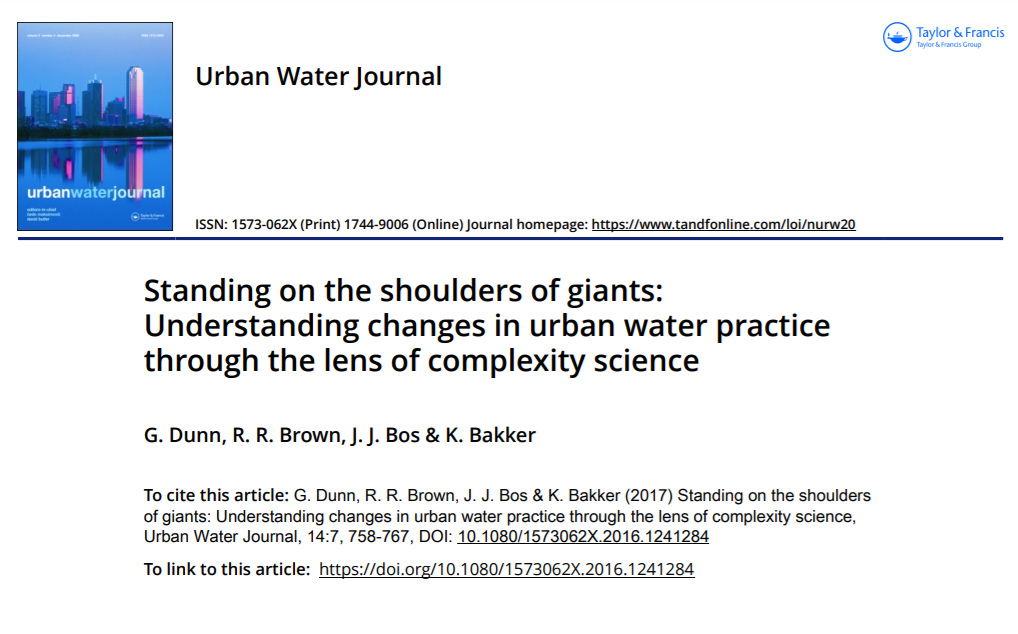
Abstract
Scholars assert that traditional approaches to urban water management need reforming. These debates have identified the need to move toward systems and complexity thinking. The literature offers limited insight into the utility of complexity theory in enhancing urban water policy and practice. This paper aims to address this gap by: (i) synthesizing the intellectual history of complexity science, (ii) identifying key principles of complexity theory and (iii) providing insights into how complexity theory can contribute to twenty-first century urban water management. We reveal how Newtonian logic is deeply embedded in contemporary Western urban water policy and practice. We identify three insights from complexity science that could potentially yield better urban water policy and practice outcomes: system boundaries; agents and networks; and far from equilibrium. These theoretical insights offer an important contribution to scholarly debates as embedded normative frameworks need to be recognized, understood and addressed before transformative change can materialize. 2016 G. Dunn, R. R. Brown, J. J. Bos & K. Bakker. (2016). Standing on the shoulders of giants: Understanding changes in urban water practice through the lens of complexity science, Urban Water Journal, DOI: 10.1080/1573062X.2016.1241284
More InfoAuthors
Gemma Dunn
Rebekah Brown
Joannette J. Bos
Karen Bakker
Navigating the Tensions in Collaborative Watershed Governance: Water Governance and Indigenous Communities in British Columbia, Canada
2016.07.01

Abstract
First Nations in British Columbia (BC), Canada, have historically been—and largely continue to be—excluded from colonial governments’ decision-making and management frameworks for fresh water. However, in light of recent legal and legislative changes, and also changes in water governance and policy, there is growing emphasis in scholarship and among legal, policy and advocacy communities on shifting water governance away from a centralized single authority towards an approach that is watershed-based, collaborative, and involves First Nations as central to decision-making processes. Drawing on community-based research, interviews with First Nations natural resource staff and community members, and document review, the paper analyzes the tensions in collaborative water governance, by identifying First Nations’ concerns within the current water governance system and exploring how a move towards collaborative watershed governance may serve to either address, or further entrench, these concerns. This paper concludes with recommendations for collaborative water governance frameworks which are specifically focused on British Columbia, but which have relevance to broader debates over Indigenous water governance. 2016 Simms, R., Harris, L., Bakker, K., and Joe, N. (2016) Navigating the Tensions in Collaborative Watershed Governance: Water Governance and Indigenous Communities in British Columbia, Canada. Geoforum. 6 – 16. DOI 10.1016/j.geoforum.2016.04.005
More InfoAuthors
Rosie Simms
Leila M. Harris
Nadia Joe
Karen Bakker
Hegemony does not imply homogeneity: Thoughts on the marketization and privatization of water (In book: Contemporary Water Governance in the Global South)
2016.04.21
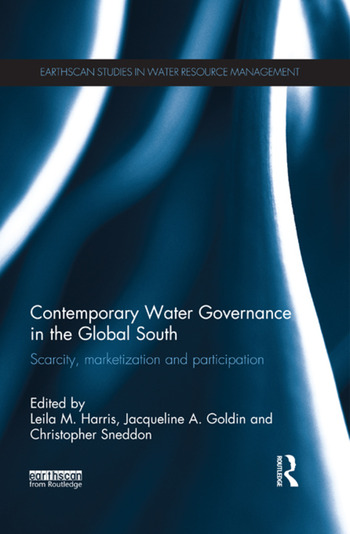
Abstract
The litany of alarming observations about water use and misuse is now familiar—over a billion people without access to safe drinking water; almost every major river dammed and diverted; increasing conflicts over the delivery of water in urban areas; continuing threats to water quality from agricultural inputs and industrial wastes; and the increasing variability of climate, including threats of severe droughts and flooding across locales and regions. These issues present tremendous challenges for water governance. This book focuses on three major concepts and approaches that have gained currency in policy and governance circles, both globally and regionally—scarcity and crisis, marketization and privatization, and participation. It provides a historical and contextual overview of each of these ideas as they have emerged in global and regional policy and governance circles and pairs these with in-depth case studies that examine manifestations and contestations of water governance internationally. The book interrogates ideas of water crisis and scarcity in the context of bio-physical, political, social and environmental landscapes to better understand how ideas and practices linked to scarcity and crisis take hold, and become entrenched in policy and practice. The book also investigates ideas of marketization and privatization, increasingly prominent features of water governance throughout the global South, with particular attention to the varied implementation and effects of these governance practices. The final section of the volume analyzes participatory water governance, querying the disconnects between global discourses and local realities, particularly as they intersect with the other themes of interest to the volume. Promoting a view of changing water governance that links across these themes and in relation to contemporary realities, the book is invaluable for students, researchers, advocates, and policy makers interested in water governance challenges facing the developing world. 2013 Bakker, K. Hegemony does not imply homogeneity: Thoughts on the marketization and privatization of water. In Contemporary Water Governance in the Global South, (Eds.) L.Harris, J. Goldin, and C. Sneddon. Routledge: London.
More InfoAuthors
Karen Bakker
Water Security: Key Issues (In book: Handbook on Water Security)
2016.01.01
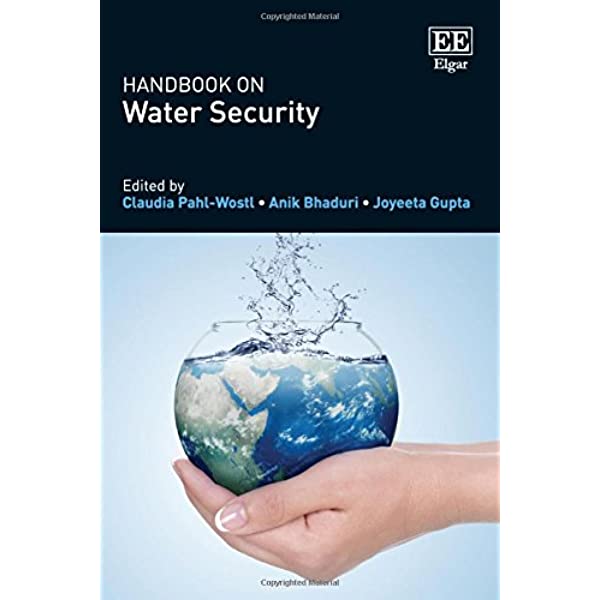
Abstract
Water security has received increasing attention in the scientific and policy community in recent years. This Handbook covers the wide range of perspectives required to understand water security as a concept guiding water governance and management at different levels and in different regions. It reflects on past, present and future challenges to water security and strategies on how to overcome them. An invaluable resource for scientific scholars, it will also appeal policymakers and practitioners interested in a deeper understanding of this important concept. 2015 Cook, C., and K. Bakker. “Water Security: Key Issues.” In Handbook on Water Security, ed. C. Pahl-Wostl, J. Gupta, and A. Baduri, 19–37. Cheltenham: Edward Elgar.
More InfoAuthors
Christina Cook
Karen Bakker
Microbial risk governance: challenges and opportunities in fresh water management in Canada
2015.06.29
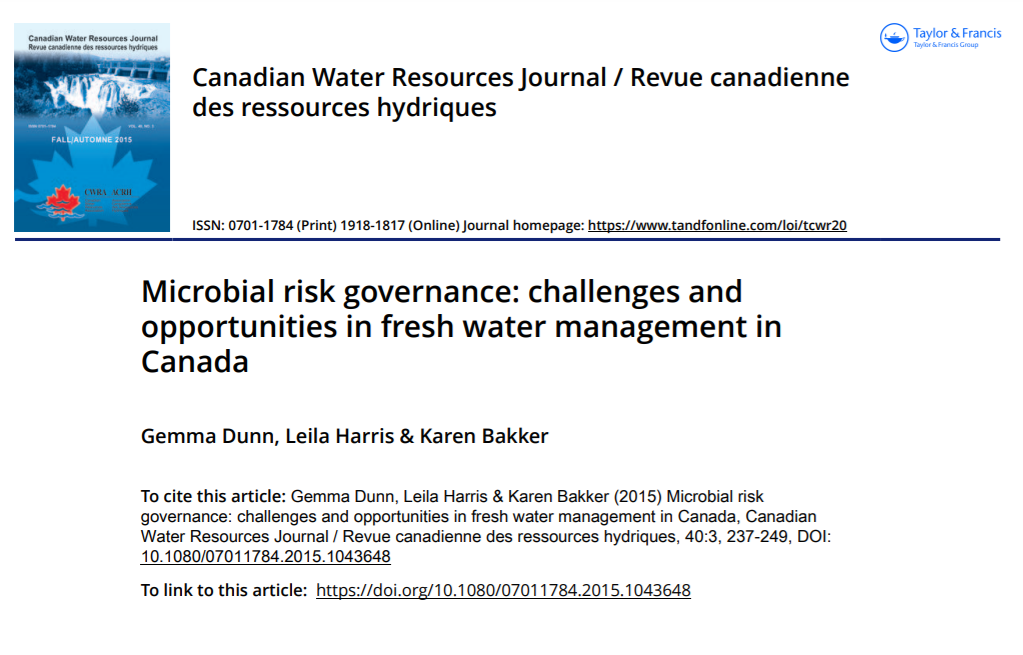
Abstract
This paper analyzes the barriers and opportunities that decentralized water governance regimes pose to effective microbial risk assessment and management for drinking and recreational water quality. The paper presents a case study of Canada (a country whose approach to water governance is among the most decentralized in the Organisation for Economic Co-operation and Development [OECD]) evaluating microbial governance approaches in British Columbia and Ontario. The analysis is timely for two reasons: (1) relatively little research has been conducted on microbial risk assessment and management from a governance perspective; the literature focuses largely on technical and methodological approaches (such as Quantitative Microbial Risk Assessment [QMRA] or Water Safety Plans); (2) 15 years post Walkerton,– little research has examined the implementation of source water protection as a strategy to reduce microbial risk in recreational and drinking water in the context of decentralized water governance. A range of issues are considered, including how decentralized governance might enable or constrain microbial risk assessment and management practices, and how the relationships between decentralized and multi-level governance actors might further deepen the complexity of watershed management, particularly source water protection. The analysis indicates that decentralized water governance in Ontario and BC may contribute to difficulties in effectuating source water protection and other features of a multi-barrier approach. The most significant challenges, as identified by practitioners, relate to the fragmentation of land and water jurisdiction, regulation, institutions and mandates, particularly a lack of coordination (both regulatory and institutional) and limited clarity on roles and responsibilities. Building on this analysis, the paper suggests more effort is required to support proactive institutional arrangements, including: inter- and intra-agency communication across levels of government; master planning and other initiatives to move towards integrated policy development; flexible, responsive policy environments; a governance culture that fosters leadership and collaboration; and holistic problem framing and mobilization of interdisciplinary knowledge. 2015 Dunn, G., Harris, L., Bakker, K.. “Microbial Risk Governance: Challenges and opportunities in freshwater management in Canada.” Canadian Water Resources Association Journal. 40(3), 237-249.
More InfoAuthors
Gemma Dunn
Leila M. Harris
Karen Bakker
Not-quite-neoliberal natures in Latin America: An introduction
2015.06.01
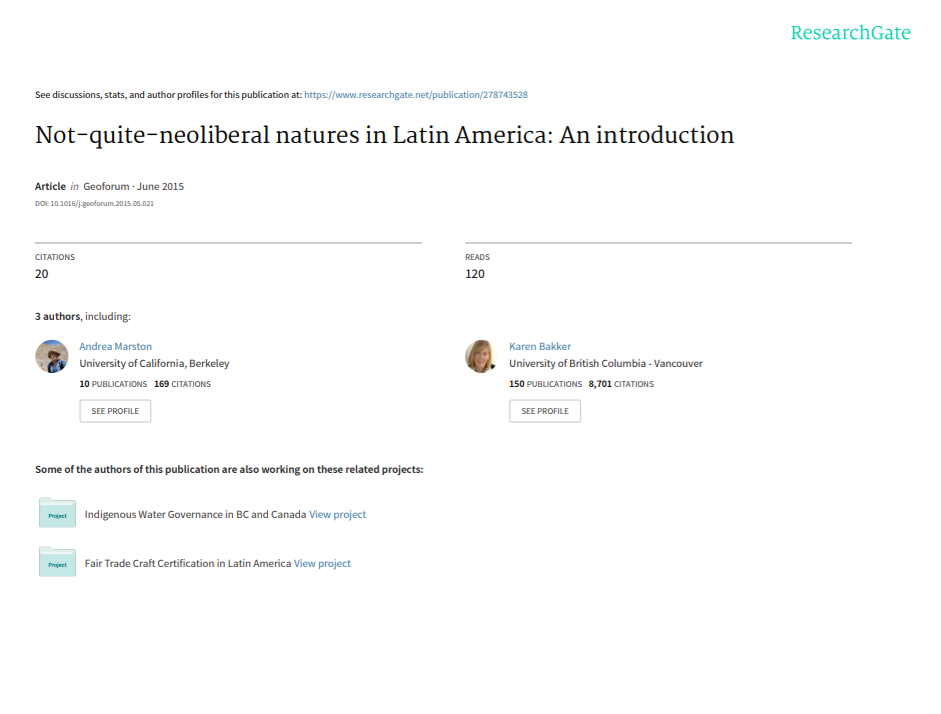
Abstract
This paper introduces the concept of ‘not-quite-neoliberal natures’ in relation to contemporary theoretical debates and Latin American political processes. The phrase is meant to signal both our appreciation of and reservations about theoretical elaborations of neoliberalism, post- neoliberalism, and (post-)neoliberal natures in relation to the wide variety of reforms currently transforming resource governance in Latin America. After reviewing theoretical debates about (post-)neoliberalism and situating them within Latin American history, we present the major themes emerging across the papers in this special issue: (1) the prevalence of concomitant and overlapping political processes, (2) the productivity of tensions and contradictions, particularly with respect to the state-society relationship, and (3) dynamism, or an insistence on the depth and liveliness of ‘context’ and ‘contestation’. 2015 de Freitas, C., A. Marston, and Karen Bakker. “Not-quite-neoliberal natures in Latin America: An introduction.” Geoforum 64: 239-245.
More InfoAuthors
Corin de Freitas
Andrea Marston
Karen Bakker
The Neoliberalization of Nature (In book: Routledge Handbook of Political Ecology)
2015.06.01
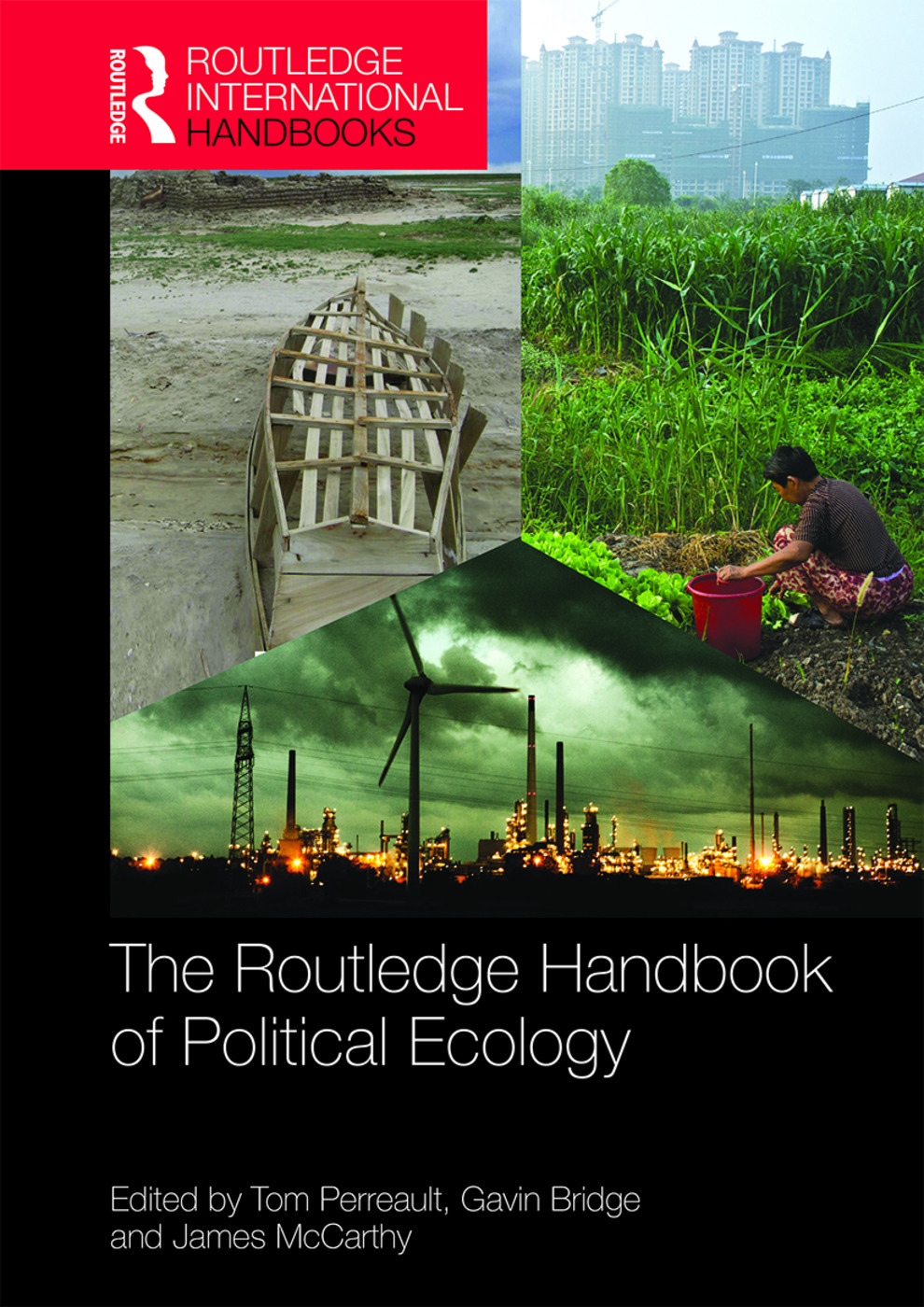
Abstract
The ‘neoliberalization of nature’ is one of the most controversial topics in contemporary environmental management. The past few decades have witnessed a rapid increase in the involvement of private corporations in resource ownership, biotechnological innovation, and the provision of ecosystem services. Simultaneously, markets (and market proxies) have been deployed as mechanisms of environmental governance at multiple scales. Advocates present these developments as a welcome ‘greening’ of capitalism that will resolve urgent environmental crises, and promise a virtuous fusion of goals of economic growth, efficiency, and environmental conservation. Opponents reject these developments as ‘greenwashing’ of the appropriation of resources and the environmental commons for private profit, which will deepen socio- 2015 Bakker, K. “The Neoliberalization of Nature.” In Routledge Handbook of Political Ecology, ed. G. Bridge, T. Perreault, and J. McCarthy, 446–56. London: Routledge.
More InfoAuthors
Karen Bakker
The Water Convention from a North American Perspective (in book: The UNECE Convention to the Protection and Use of Transboundary Watercourses and International Lakes)
2015.04.21
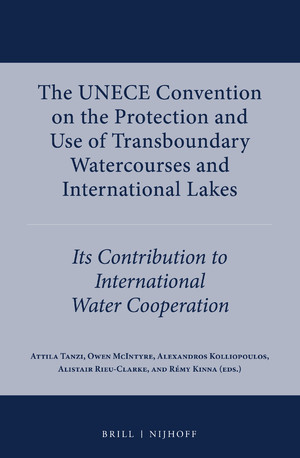
Abstract
The UNECE Convention on the Protection and Use of Transboundary Watercourses and International Lakes provides invaluable insights into the contribution of this international agreement towards transboundary water cooperation via its legal provisions, accompanying institutional arrangements and subsidiary policy mechanisms. Contributing authors - experts on key aspects of the Convention - address a broad range of issues, primarily concerning its: development and evolution; relationship with other multi-lateral agreements; regulatory framework and general principles; tools for arresting transboundary pollution; procedural rules; compliance and liability provisions; and select issues including its Protocol on Water and Health. 2015 Norman, E.S., A. Cohen, and K. Bakker. “The Water Convention from a North American Perspective.” In The UNECE Convention to the Protection and Use of Transboundary Watercourses and International Lakes; Its Contribution to Internation, ed. A. Tanzi, O. McIntyre, A. Kolliopoulos, and A. Rieu-Clarke, 423–34. Boston: Brill Press.
More InfoAuthors
Emma S. Norman
Alice Cohen
Karen Bakker
Do good fences make good neighbors? Canada-United States Transboundary Water Governance, the Boundary Waters Treaty, and 21st century challenges
2015.01.01
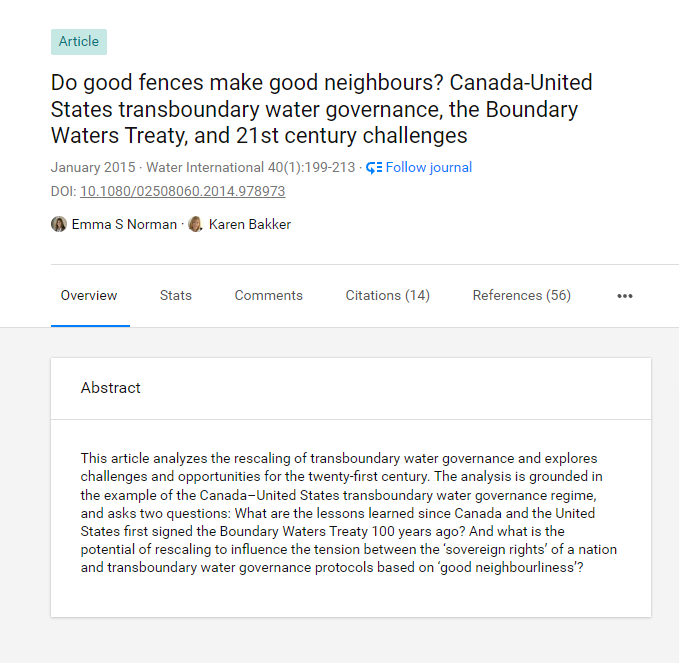
Abstract
This article analyzes the rescaling of transboundary water governance and explores challenges and opportunities for the twenty-first century. The analysis is grounded in the example of the Canada–United States transboundary water governance regime, and asks two questions: What are the lessons learned since Canada and the United States first signed the Boundary Waters Treaty 100 years ago? And what is the potential of rescaling to influence the tension between the ‘sovereign rights’ of a nation and transboundary water governance protocols based on ‘good neighbourliness’? 2015 Norman, E. and K. Bakker.“Do good fences make good neighbors? Canada-United States Transboundary Water Governance, the Boundary Waters Treaty, and 21st century challenges.” Water International. 40(1), 199-213.
More InfoAuthors
Emma S. Norman
Karen Bakker
(Post)Colonial Pipes Urban Water Supply in Colonial and Contemporary Jakarta. (In book: In Cars, Conduits and Kampongs: Modernization of the Indonesian city, 1920-1960)
2014.09.01

Abstract
"Cars, Conduits and Kampongs offers a wide panorama of the modernization of the cities in Indonesia between 1920 and 1960. The contributions present a case for asserting that Indonesian cities were not merely the backdrop to processes of modernization and rising nationalism, but formed a causal factor. Modernization, urbanization, and decolonization were intrinsically linked. The various chapters deal with such innovations as the provision of medical treatments, fresh water and sanitation, the implementation of town planning and housing designs, and policies for coping with increased motorized traffic and industrialization. The contributors share a broad critique of the economic and political dimensions of colonialism, but remain alert to the agency of colonial subjects who respond, often critically, to a European modernity" 2014 Kooy, M., and K. Bakker. “(Post)Colonial Pipes Urban Water Supply in Colonial and Contemporary Jakarta.” In Cars, Conduits and Kampongs: Modernization of the Indonesian city, 1920 – 1960. Eds. F. Colombijn and J. Cote, 63–86. Leiden: Brill.
More InfoAuthors
Michelle Kooy
Karen Bakker
The Business of Water: Market Environmentalism in the Water Sector
2014.07.25
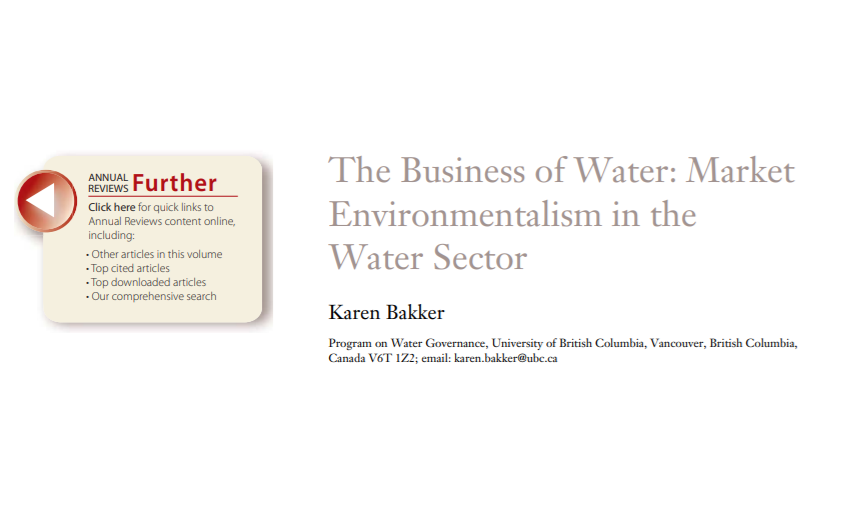
Abstract
This article reviews the literature relevant to market environmentalism in the water sector, focusing on five themes: the privatization of resource ownership and management, the commercialization of resource management organizations, the environmental valuation and pricing of resources, the marketization of trading and exchange mechanisms, and the liberalization of governance. For each dimension, the discussion addresses a topic of contemporary academic interest (and policy and political relevance): privatization and protest, the contradictions of commercialization, the distinction between environmental valuation and commodification, the multiplication of modes of marketization, and the limits to the liberalization of environmental governance. Specific attention is given to unresolved questions and tensions in the debate over market environmentalism, particularly the tension between human rights and environmental rights and among state, market, and community roles in water management. 2014 Bakker, K. ‘The Business of Water: Market Environmentalism in the Water Sector’ Annual Review of Environment and Resources. 39(1), 469 – 494.
More InfoAuthors
Karen Bakker
Drinking Water Quality Guidelines across Canadian Provinces and Territories: Jurisdictional Variation in the Context of Decentralized Water Governance
2014.05.01
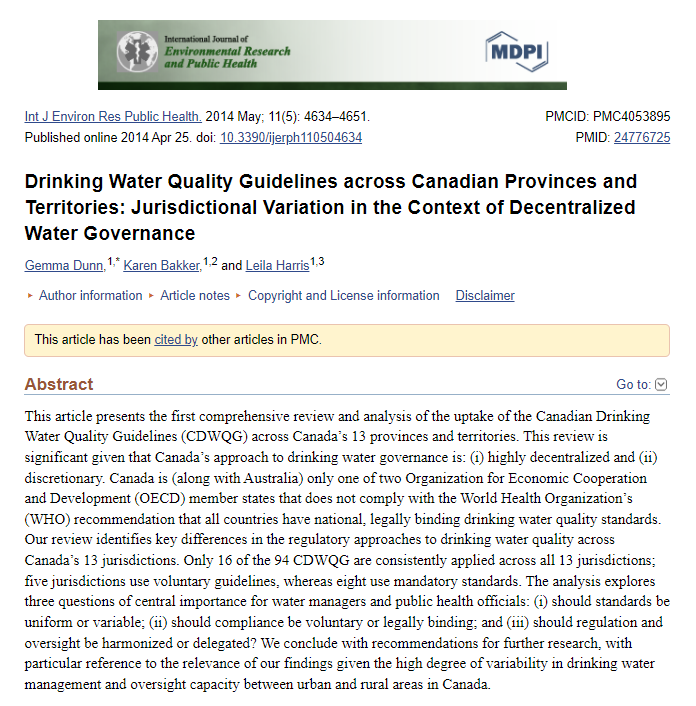
Abstract
This article presents the first comprehensive review and analysis of the uptake of the Canadian Drinking Water Quality Guidelines (CDWQG) across Canada’s 13 provinces and territories. This review is significant given that Canada’s approach to drinking water governance is: (i) highly decentralized and (ii) discretionary. Canada is (along with Australia) only one of two Organization for Economic Cooperation and Development (OECD) member states that does not comply with the World Health Organization’s (WHO) recommendation that all countries have national, legally binding drinking water quality standards. Our review identifies key differences in the regulatory approaches to drinking water quality across Canada’s 13 jurisdictions. Only 16 of the 94 CDWQG are consistently applied across all 13 jurisdictions; five jurisdictions use voluntary guidelines, whereas eight use mandatory standards. The analysis explores three questions of central importance for water managers and public health officials: (i) should standards be uniform or variable; (ii) should compliance be voluntary or legally binding; and (iii) should regulation and oversight be harmonized or delegated? We conclude with recommendations for further research, with particular reference to the relevance of our findings given the high degree of variability in drinking water management and oversight capacity between urban and rural areas in Canada. 2014 Dunn, G., Harris, L., Bakker, K., and Allen, D. Drinking Water Quality Guidelines across Canadian Provinces and Territories: Jurisdictional variation in the context of decentralized water governance. International Journal of Environmental Research and Public Health, 11(5), 4634-4651. (third author; contribution 25%)
More InfoAuthors
Gemma Dunn
Leila M. Harris
Karen Bakker
The Eco-Scalar Fix: Rescaling Environmental Governance and the Politics of Ecological Boundaries in Alberta, Canada
2014.01.01
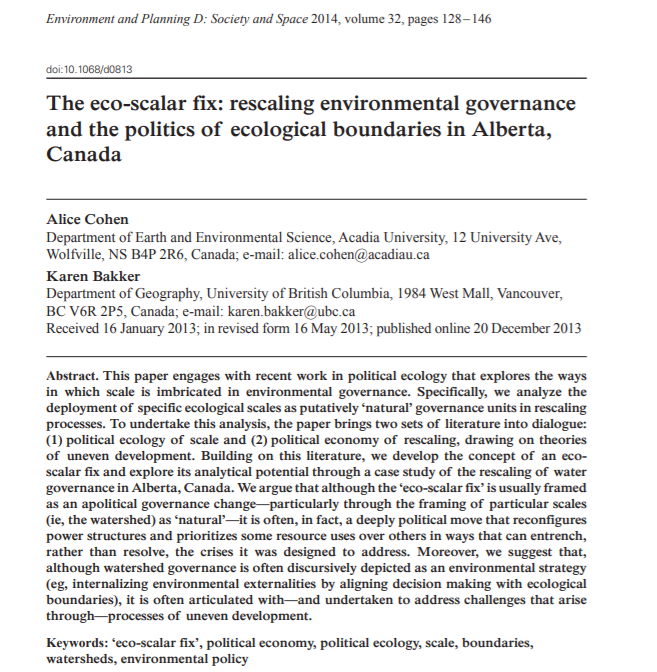
Abstract
This paper engages with recent work in political ecology that explores the ways in which scale is imbricated in environmental governance. Specifically, we analyze the deployment of specific ecological scales as putatively ‘natural’ governance units in rescaling processes. To undertake this analysis, the paper brings two sets of literature into dialogue: (1) political ecology of scale and (2) political economy of rescaling, drawing on theories of uneven development. Building on this literature, we develop the concept of an ecoscalar fix and explore its analytical potential through a case study of the rescaling of water governance in Alberta, Canada. We argue that although the ‘eco-scalar fix’ is usually framed as an apolitical governance change—particularly through the framing of particular scales (ie, the watershed) as ‘natural’—it is often, in fact, a deeply political move that reconfigures power structures and prioritizes some resource uses over others in ways that can entrench, rather than resolve, the crises it was designed to address. Moreover, we suggest that, although watershed governance is often discursively depicted as an environmental strategy (eg, internalizing environmental externalities by aligning decision making with ecological boundaries), it is often articulated with—and undertaken to address challenges that arise through—processes of uneven development. 2014 Cohen, A. and K. Bakker. The eco-scalar fix: Rescaling environmental governance and the politics of ecological boundaries. Environment and Planning D: Society and Space. doi:10.1068/d0813.
More InfoAuthors
Alice Cohen
Karen Bakker
The Governance Dimensions of Water Security: A review
2013.11.13
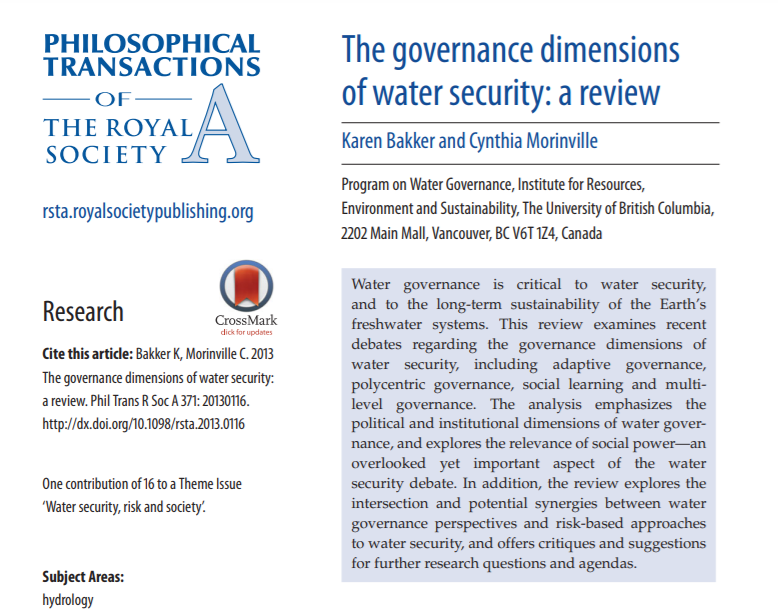
Abstract
Water governance is critical to water security, and to the long-term sustainability of the Earth's freshwater systems. This review examines recent debates regarding the governance dimensions of water security, including adaptive governance, polycentric governance, social learning and multi-level governance. The analysis emphasizes the political and institutional dimensions of water governance, and explores the relevance of social power—an overlooked yet important aspect of the water security debate. In addition, the review explores the intersection and potential synergies between water governance perspectives and risk-based approaches to water security, and offers critiques and suggestions for further research questions and agendas 2013 Bakker, K. and C. Morinville ‘The Governance Dimensions of Water Security: A review.’ Philosophical Transactions of the Royal Society A: Mathematical, Physical and Engineering Science.371 (2002), 2013011
More InfoAuthors
Karen Bakker
Cynthia Morinville
Debating the ‘post-neoliberal turn’ in Latin America
2013.08.30

Abstract
In this paper, we critically engage with the notion of a ‘post-neoliberal turn’ in Latin America. The analysis interrogates the existence and characteristics of post-neoliberalism as a mode of regulation, and explores the contributions (and limits) of the concept as a means of theorizing political and economic restructuring. We critically synthesize the literature, articulating commonly cited principles and practices of post-neoliberalism according to different political, ideological, and geographical contexts. To generate productive engagement across disciplinary and geographical boundaries, we draw on perspectives from Latin America and on concepts of ‘variegated neoliberalization’ and ‘counter-neoliberalization’ (thereby abstracting from, rather than about, Latin America). 2014 Yates, J. and K. Bakker. Neoliberalism and Post-neoliberalism in Latin America. Progress in Human Geography. 38(1), 62 – 91. (second author: contribution 40%)
More InfoAuthors
Julian S. Yates
Karen Bakker
Neoliberal Versus Postneoliberal Water: Geographies of Privatization and Resistance
2013.02.27
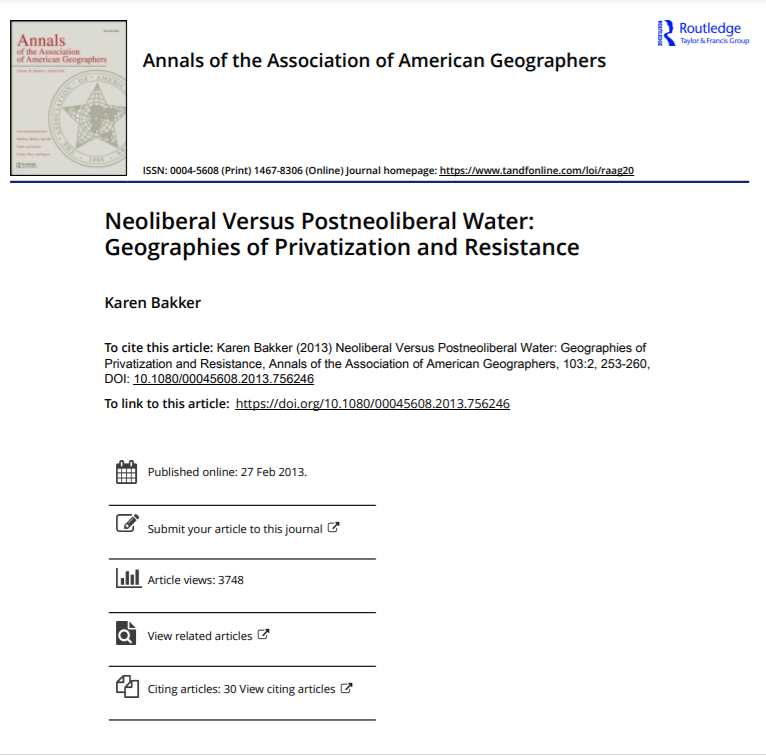
Abstract
This article documents the increasingly variegated pattern of urban water supply privatization since the 1990s. The analysis cautions against sweeping generalizations of postneoliberalism often associated with putative alternatives to private water supply. The continued growth of private-sector activity, combined with the strategic retreat of private companies from certain countries and regions, should be interpreted as a partial intensification of—rather than straightforward retreat from—neoliberalization. The article concludes with reflections on the relevance of the findings for broader debates over neoliberalization and postneoliberalism. 2013 Bakker, K. Neoliberal Versus Postneoliberal Water: Geographies of Privatization and Resistance. Annals of the Association of American Geographers, 253-260.
More InfoAuthors
Karen Bakker
Constructing ‘Public’ Water: The World Bank, Urban Water Supply, and the Biopolitics of Development
2013.01.01
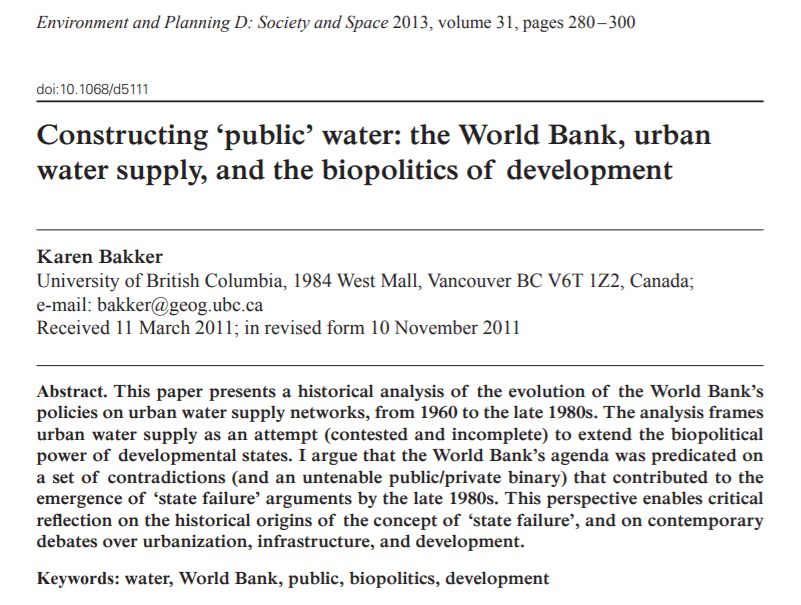
Abstract
This paper presents a historical analysis of the evolution of the World Bank's policies on urban water supply networks, from 1960 to the late 1980s. The analysis frames urban water supply as an attempt (contested and incomplete) to extend the biopolitical power of developmental states. I argue that the World Bank's agenda was predicated on a set of contradictions (and an untenable public/private binary) that contributed to the emergence of ‘state failure’ arguments by the late 1980s. This perspective enables critical reflection on the historical origins of the concept of ‘state failure’, and on contemporary debates over urbanization, infrastructure, and development. 2013 Bakker, K. Constructing “public” water: The World Bank and water as an object of development. Environment & Planning D, 31(2), 280-300.
More InfoAuthors
Karen Bakker
Water Security: Research challenges and opportunities
2012.08.24

Abstract
An estimated 80% of the world's population faces a high-level water security or water-related biodiversity risk (1). The issue of water security—defined as an acceptable level of water-related risks to humans and ecosystems, coupled with the availability of water of sufficient quantity and quality to support livelihoods, national security, human health, and ecosystem services (2, 3)—is thus receiving considerable attention. To date, however, the majority of academic research on water security is relatively poorly integrated with the needs of policy-makers and practitioners; hence, substantial changes to funding, education, research frameworks, and academic incentive structures are required if researchers are to be enabled to make more substantive contributions to addressing the global water crisis. 2012 Bakker, K. Water Security: Research challenges and opportunities. Science, 337, 914.
More InfoAuthors
Karen Bakker
The ‘matter of nature’ in economic geography (in book: The New Companion to Economic Geography)
2012.07.20
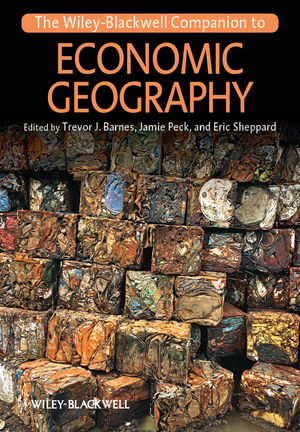
Abstract
The Wiley-Blackwell Companion to Economic Geography presents students and researchers with a comprehensive overview of the field, put together by a prestigious editorial team, with contributions from an international cast of prominent scholars. Offers a fully revised, expanded, and up-to-date overview, following the successful and highly regarded Companion to Economic Geography published by Blackwell a decade earlier, providing a comprehensive assessment of the field. Takes a prospective as well as retrospective look at the field, reviewing recent developments, recurrent challenges, and emerging agendas. Incorporates diverse perspectives (in terms of specialty, demography and geography) of up and coming scholars, going beyond a focus on Anglo-American research. Encourages authors and researchers to engage with and contextualize their situated perspectives. Explores areas of overlap, dialogues, and (potential) engagement between economic geography and cognate disciplines 2012 Bakker, K. “The ‘matter of nature’ in economic geography.” In Barnes, T., Peck, J. and E. Sheppard (eds.) The New Companion to Economic Geography. New York: Wiley-Blackwell.
More InfoAuthors
Karen Bakker
Water security: Debating an emerging paradigm
2012.02.01

Abstract
This paper presents a comprehensive review of the concept of water security, including both academic and policy literatures. The analysis indicates that the use of the term water security has increased significantly in the past decade, across multiple disciplines. The paper presents a comparison of definitions of, and analytical approaches to, water security across the natural and social sciences, which indicates that distinct, and at times incommensurable, methods and scales of analysis are being used. We consider the advantages and disadvantages of narrow versus broad and integrative framings of water security, and explore their utility with reference to integrated water resources management. In conclusion, we argue that an integrative approach to water security brings issues of good governance to the fore, and thus holds promise as a new approach to water management. 2012 Cook, C. and K. Bakker. Water Security: Debating an emerging paradigm. Global Environmental Change, 22(1), 94–102.
More InfoAuthors
Christina Cook
Karen Bakker
Splintered Urbanisms: Water, urban infrastructure, and the modern social imaginary (in book: Urban Constellations)
2011.04.30
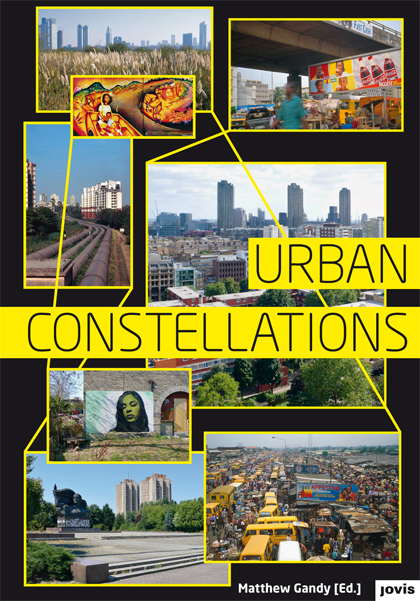
Abstract
Cities are an unprecedented focus of attention: over half the world now lives in them, culture and politics are shaped by them, and they are also focal points for new relationships between nature, technology and the human body. This essay collection brings together a range of cutting-edge international scholarship on cities, urbanization and urban culture. The format of the collection is a series of small essays in the spirit of Benjamin, Kracauer and other innovative forms of writing and observation. The collection explores themes such as new forms of political mobilization, the effects of economic instability, the political ecology of urban nature and the presence of collective memory. Cultural aspects of urban change are also considered including the work of artists, film makers and others, who have sought to critically engage with processes of urban change. The global scope of the collection includes essays on London, Berlin and Los Angeles, as well as less extensively studied cities such as Buenos Aires, Lagos and Seoul. 2011 Bakker, K. Splintered Urbanisms: Water, urban infrastructure, and the modern social imaginary In Gandy, M. (ed.) Urban Constellations Berlin: Jovis, 62–64.
More InfoAuthors
Karen Bakker
Water Governance in Canada: Innovation and Fragmentation
2011.04.21
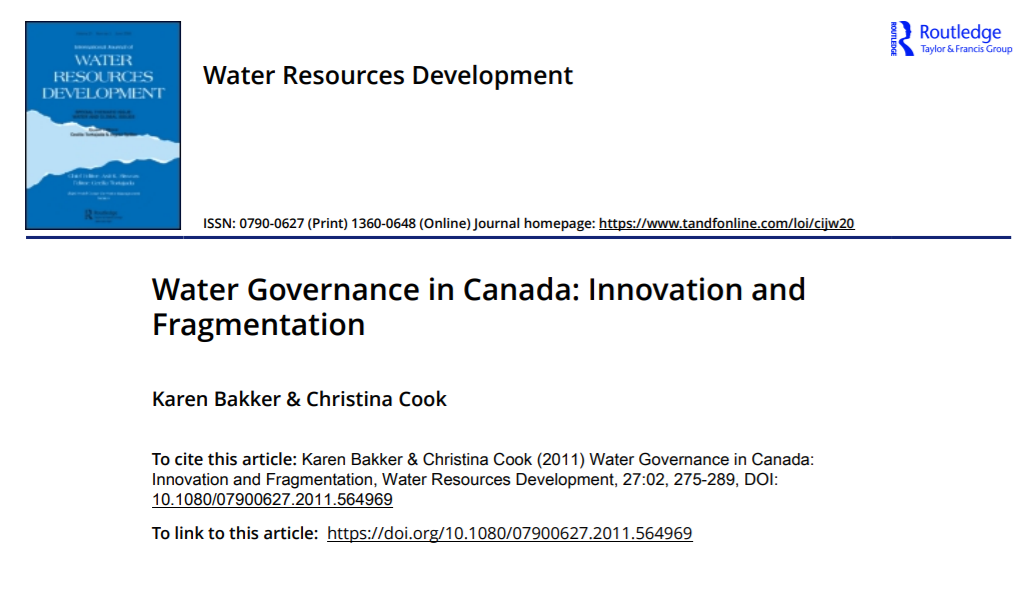
Abstract
This paper explores Canada's approach to water governance. It argues that fragmented governance has had negative impacts on Canada's ability to manage water resources adequately (particularly in the context of urbanization, agriculture and resource extraction), and to deal with new issues (such as climate change). Further, it argues that Canada's highly decentralized approach to water governance creates challenges of integration, coordination and data availability. The paper explores possible future strategies for innovations in water governance that may have the potential to improve water management outcomes. 2011 Bakker, K. and Cook, C. Water governance in Canada: Innovation in the context of fragmentation. International Journal of Water Resources Development, 27(2): 275–289.
More InfoAuthors
Christine Cook
Karen Bakker
Conflicts over water supply in Jakarta, Indonesia (in book: Urban Water Conflicts)
2011.01.01
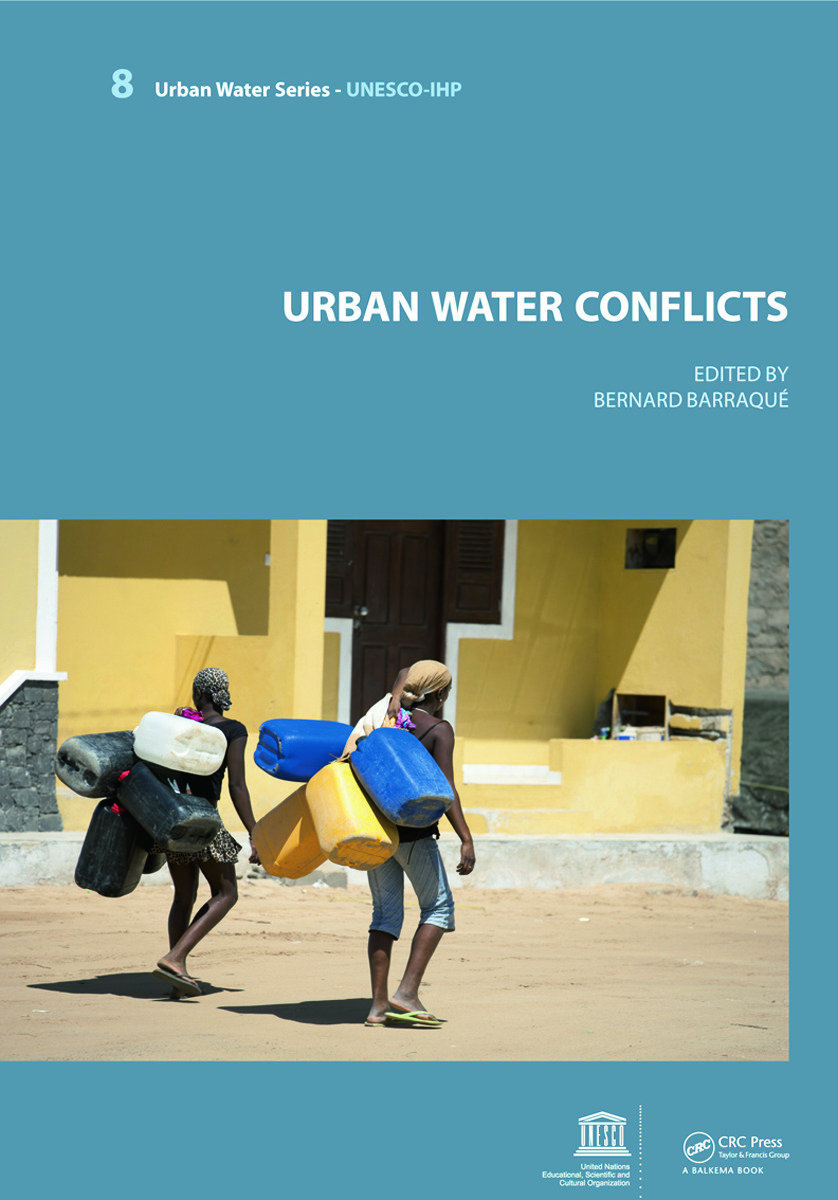
Abstract
Urban water conflicts manifested first in Europe in the 19th century and are observed nowadays in various forms throughout the world; in particular, in developing countries. Main causes of these conflicts are characterized by complex socioeconomic and institutional issues related to urban water management. The debate about public water services versus private water supplies is frequently associated with conflicts over water price and affordability. On the other hand, the issue of centralization versus decentralization of water utilities is also often discussed in the context of institutional aspects of urban water management. These issues are intertwined and, thereby, a critical examination of socioeconomic and institutional aspects of urban water management in a holistic way is important for better understanding water conflicts in urban areas. Urban Water Conflicts – the output of a project by UNESCO’s International Hydrological Programme on “Socioeconomic and Institutional Aspects in Urban Water Management” – presents a collection of essays on socioeconomic and institutional aspects of urban water management, focusing on water and sanitation services. The book examines interdisciplinary approaches to understanding and analyzing conflicts that arise from inadequate urban water management. Conflict analysis is addressed in some essays by taking into account economic, environmental and social dimensions of sustainability. The issue of institutional conflicts between different levels of government is also discussed in some case studies. 2011 Bakker, K. Conflicts over water supply in Jakarta, Indonesia. In Barraque, B. (Ed.), Urban Water Conflicts, Paris: UNESCO, 195–217.
More InfoAuthors
Karen Bakker
The human right to water revisited (in book: The Right to Water)
2011.01.01
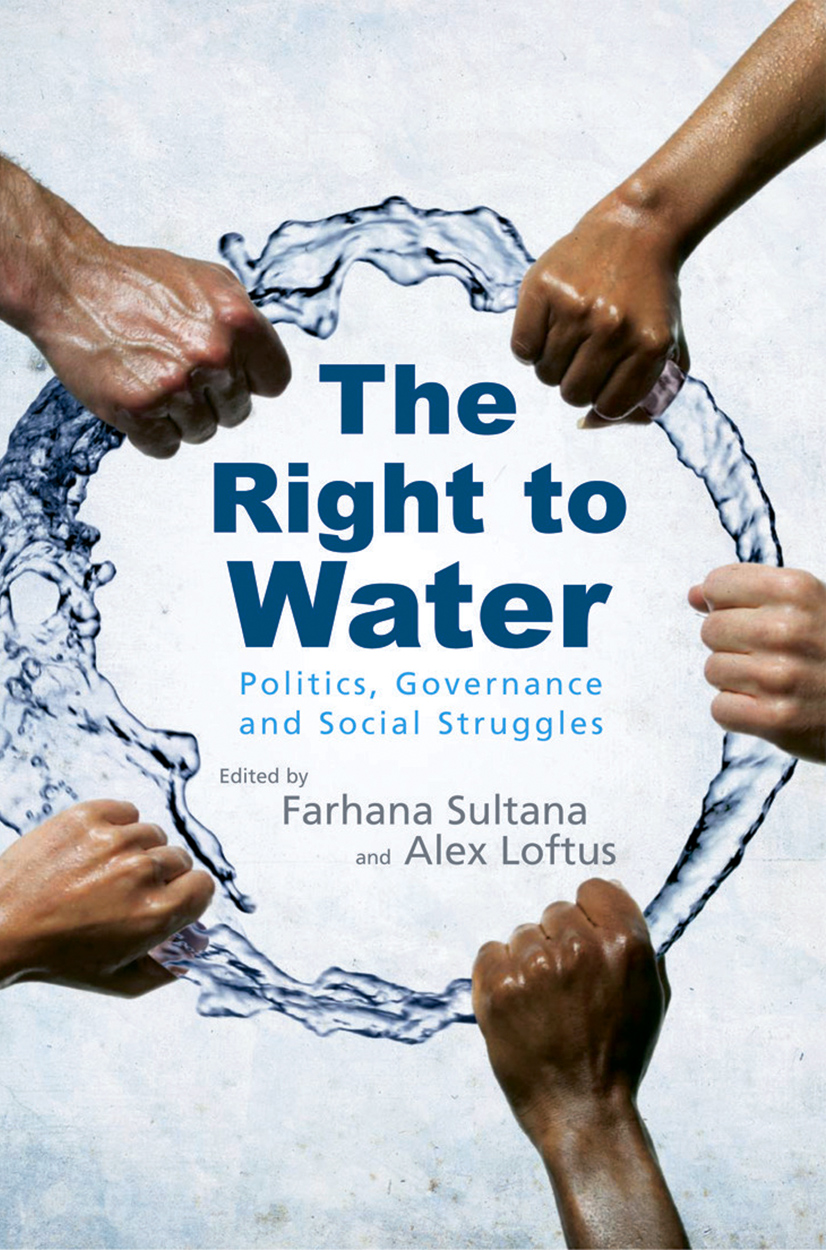
Abstract
The right to clean water has been adopted by the United Nations as a basic human right. Yet how such universal calls for a right to water are understood, negotiated, experienced and struggled over remain key challenges. The Right to Water elucidates how universal calls for rights articulate with local historical geographical contexts, governance, politics and social struggles, thereby highlighting the challenges and the possibilities that exist. Bringing together a unique range of academics, policy-makers and activists, the book analyzes how struggles for the right to water have attempted to translate moral arguments over access to safe water into workable claims. This book is an intervention at a crucial moment into the shape and future direction of struggles for the right to water in a range of political, geographic and socio-economics contexts, seeking to be pro-active in defining what this struggle could mean and how it might be taken forward in a far broader transformative politics. The Right to Water engages with a range of approaches that focus on philosophical, legal and governance perspectives before seeking to apply these more abstract arguments to an array of concrete struggles and case studies. In so doing, the book builds on empirical examples from Africa, Asia, Oceania, Latin America, the Middle East, North America and the European Union. http://www.watergovernance.ca/2011/11/28/new-book-the-right-to-water/ 2011 Bakker, K. The human right to water revisited. In Sultana, F., Budds, J. and Loftus, A. (eds). The Right to Water. London: Earthscan, 19–44.
More InfoAuthors
Karen Bakker
Commons versus commodities: political ecologies of water privatization (in book: Global Political Ecology)
2010.12.17
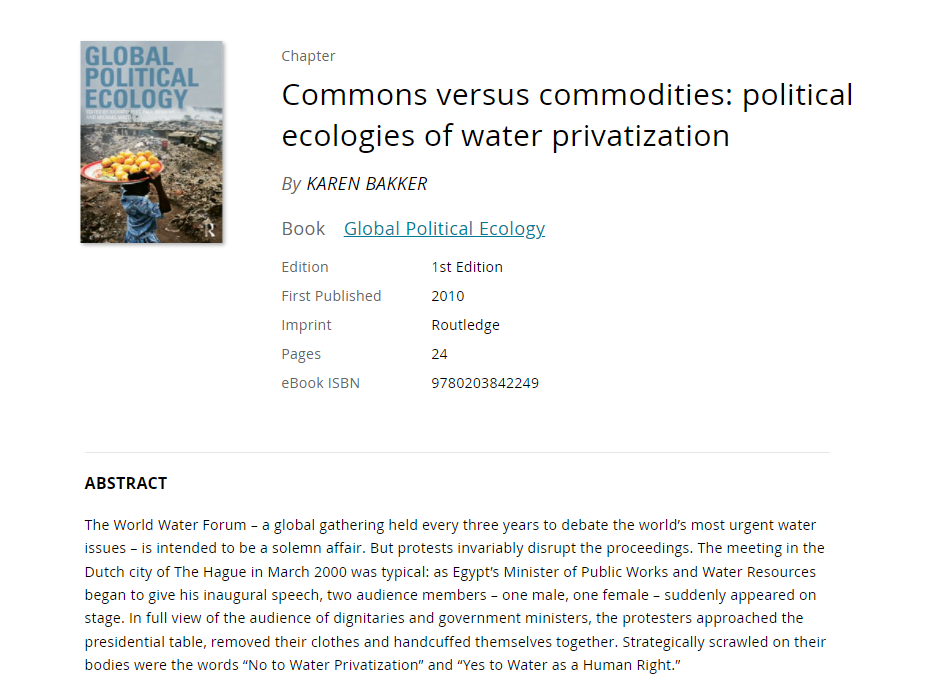
Abstract
The World Water Forum – a global gathering held every three years to debate the world’s most urgent water issues – is intended to be a solemn affair. But protests invariably disrupt the proceedings. The meeting in the Dutch city of The Hague in March 2000 was typical: as Egypt’s Minister of Public Works and Water Resources began to give his inaugural speech, two audience members – one male, one female – suddenly appeared on stage. In full view of the audience of dignitaries and government ministers, the protesters approached the presidential table, removed their clothes and handcuffed themselves together. Strategically scrawled on their bodies were the words “No to Water Privatization” and “Yes to Water as a Human Right.”
More InfoAuthors
Karen Bakker
Debating green neoliberalism: The limits of “neoliberal natures”
2010.12.01
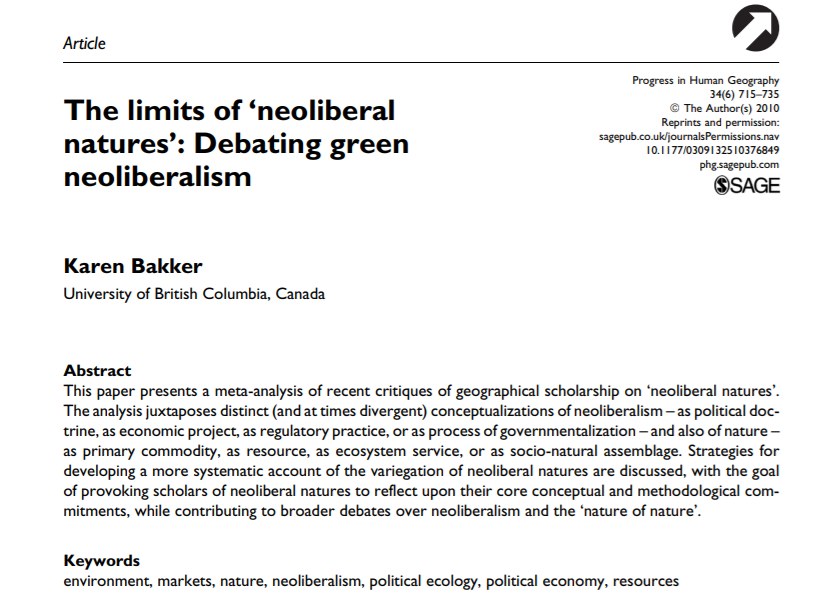
Abstract
This paper presents a meta-analysis of recent critiques of geographical scholarship on ‘neoliberal natures’. The analysis juxtaposes distinct (and at times divergent) conceptualizations of neoliberalism – as political doctrine, as economic project, as regulatory practice, or as process of governmentalization – and also of nature – as primary commodity, as resource, as ecosystem service, or as socio-natural assemblage. Strategies for developing a more systematic account of the variegation of neoliberal natures are discussed, with the goal of provoking scholars of neoliberal natures to reflect upon their core conceptual and methodological commitments, while contributing to broader debates over neoliberalism and the ‘nature of nature’. 2010 Bakker, K. Debating green neoliberalism: The limits of “neoliberal natures”. Progress in Human Geography,34(6), 715–735.
More InfoAuthors
Karen Bakker
Governing Water across the Canada-U.S. Borderland (in book: Borders and Bridges: Navigating Canada’s International Policy Relations in a North America Context)
2010.04.12
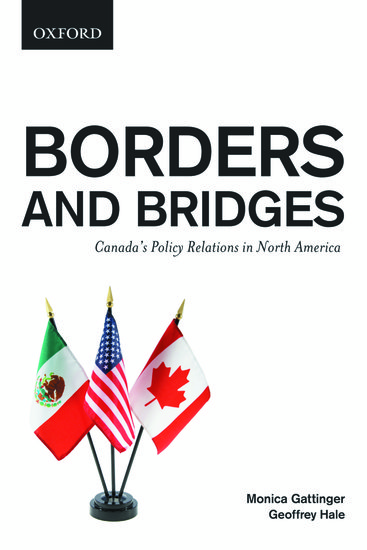
Abstract
Borders and Bridges in North America is an edited collection of essays by leading and emerging scholars from Canada and the United States that examines Canada's policy relations within a North American context. Grounded in the idea that Canadian policy is contextual-heavily influenced by both North American and global forces-editors Monica Gattinger and Geoffrey Hale trace policy changes from the signing of CUFTA, through NAFTA and 9/11 to the present, with a principal focus on the last decade. 2010 Norman, E. and K. Bakker. Governing Water across the Canada – U.S. Borderland. In G. Hale and M. Gattinger (eds.), Borders and Bridges: Navigating Canada’s International Policy Relations in a North America Context. Oxford University Press, 194–212.
More InfoAuthors
Emma Norman
Karen Bakker
The Contradictions in ‘Alternative’ Service Delivery: Governance, Business Models, and Sustainability in Municipal Water Supply
2010.01.01
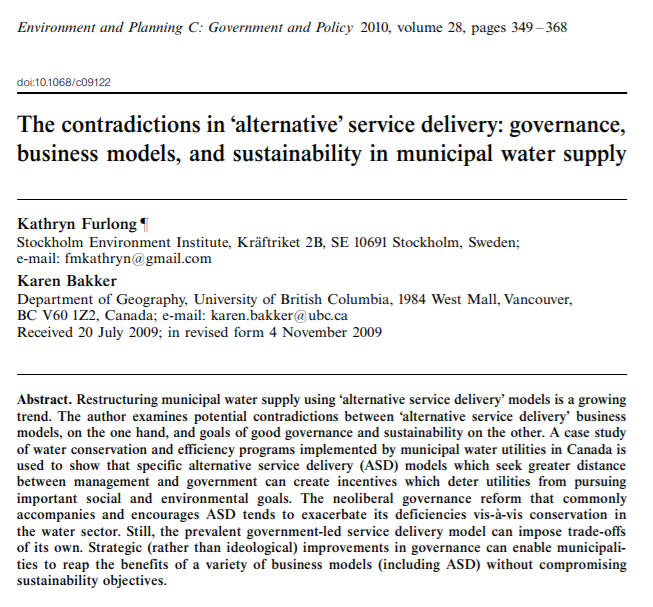
Abstract
Restructuring municipal water supply using ‘alternative service delivery’ models is a growing trend. The author examines potential contradictions between ‘alternative service delivery’ business models, on the one hand, and goals of good governance and sustainability on the other. A case study of water conservation and efficiency programs implemented by municipal water utilities in Canada is used to show that specific alternative service delivery (ASD) models which seek greater distance between management and government can create incentives which deter utilities from pursuing important social and environmental goals. The neoliberal governance reform that commonly accompanies and encourages ASD tends to exacerbate its deficiencies vis-à-vis conservation in the water sector. Still, the prevalent government-led service delivery model can impose trade-offs of its own. Strategic (rather than ideological) improvements in governance can enable municipalities to reap the benefits of a variety of business models (including ASD) without compromising sustainability objectives. 2010 Furlong, K. and Bakker, K. The contradictions of ‘good’ governance: Business Models, Alternative Service Delivery, and Sustainability in Municipal Water Supply. Environment and Planning C 28(2), 349–368.
More InfoAuthors
Kathryn Furlong
Karen Bakker
Participation du secteur privé à la gestion des services des eaux : tendances récentes et débats dans les pays en voie de développement
2009.04.01
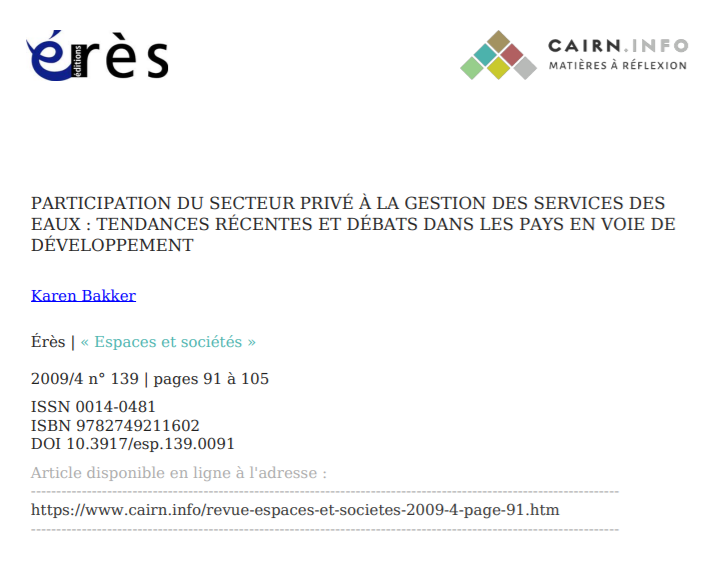
Abstract
Ces deux dernières décennies, la participation du secteur privé a été l’une des questions les plus controversées de la gestion des réseaux urbains de l’eau dans les pays en voie de développement. Cet article s’intéresse aux tendances récentes sur cette question, et présente de façon synthétique des éléments qui semblent montrer que le modèle le plus courant – des compagnies multinationales, engagées dans des contrats de délégation de service public à long terme – a connu un repli stratégique. L’analyse expose brièvement la réorientation stratégique du secteur privé, et suit l’évolution subséquente des doctrines et débats concernant la gestion privée ou publique de l’approvisionnement en eau. En guise de conclusion, l’article suggère la nécessité d’élargir nos conceptions de la gouvernance pour prendre en compte les questions du pouvoir et des politiques dans le contexte d’une citoyenneté urbaine. 2010 Bakker, K. Participation du secteur privé à la gestion des services des eaux : Tendances récentes et débats dans les pays en voie de développement. Espaces et Societés 139, 91–105.
More InfoAuthors
Karen Bakker